#but like. why are you using an example of him being ableist as him being a little snarky or sarcastic or funny or whatever
Explore tagged Tumblr posts
Text
*comic panel of dick grayson being incredibly ableist towards barbara*
all the tags: haha love him hes soo sassy xD
#yea yeah writers effect character behavior im a batman fan i get it#but like. why are you using an example of him being ableist as him being a little snarky or sarcastic or funny or whatever#its YOUR job as the reader to understand that even if it was meant as a joke (usually its just an insult)#that its not appropriate for you to laugh and dismiss the actual harm in what was said#ransom note
11 notes
·
View notes
Text
it is not really a shock that this fandom has a bit of a misogyny problem, but i think a specific one is how the boys are often somewhat babied and given all sorts of pity for every single tiny thing they go through, while the girls with similar issues are often ignored entirely. there are many examples of this, but right now, i am going to talk at length about the Tenmas and the Shinonomes in particular, as them being pairs of siblings allows very direct comparison.
firstly, the one that irks me most: Tsukasa Tenma, and how a ridiculous number of his fans will make absolutely everything about him. including Saki's disability. i do think it's right to acknowledge the impact on him as well- but it gets overdramatic really quickly. i'm sorry to be harsh, but Saki did not spend her childhood in and out of hospitals, believing that she was dying, just for half the fandom to completely brush over her trauma and be like "oh... poor, lonely Tsukasa..."
i rather hate this, because not only does it feel quite ableist to skim over the one directly suffering from the condition in order to massively favour someone who happens to feel a bit of the knock-on effect, but it's also used to unreasonably villainise the Tenma parents. people will go on about how "neglected" Tsukasa was... very well, how exactly would you have handled the situation? they did their absolute best. it was a highly unfortunate situation for everyone involved, and it's unfair to deem Mrs and Mr Tenma as "bad parents" simply because they prioritised their dangerously ill daughter over their confident son who always assured them that he'd be alright. yes, they could have made better choices for Tsukasa, such as hiring a babysitter... but i think people tend to forget that Saki's illness flared up very suddenly and randomly. as the good parents the Tenmas are, they very likely couldn't think properly due to their panic for their daughter. it was instinct to drop everything and get her immediate help. and Tsukasa himself understands this, so it's an absolute wonder that the fandom doesn't. he was not ignored. he was phoned, updated on the situation, reassured that his sister was recovering... and praised by his parents for being such a wonderful brother.
also, with the situation of Saki's hospitalisation, i do feel like Tsukasa's own personality is sometimes not taken into account, ironic since it's him that everyone's interested in. because i would, in fact, be more critical of the Tenma parents, had Tsukasa been a more fragile child. if he had been the type who was easily scared, who could not handle being by himself, who would, in fact, have been traumatised from being left alone- i would say that the Tenma parents would have deserved the treatment they get from the fandom. but... that's not Tsukasa. it has been shown that Tsukasa was always a very bright, self-assured boy, positively brimming with confidence. even when little, he was creative and strong- and his parents knew this. they could have some peace of mind during a stressful time, knowing that their son could entertain himself with ease, such as how he was practising some acting just before his mother rang him. all of this is shown within the Dazzling Stage event which is, funnily enough, the very same event that the lovers of Tsukasa angst latch onto.
of course Tsukasa was heavily concerned about Saki. he is an incredibly caring person, why wouldn't he be? and yes, of course he missed her while she was in the hospital. no one is trying to deny that, nor minimise his suffering. the fandom does that to Saki. while acknowledging that Tsukasa was affected is good, in fact, it is very interesting to see the impact of disabilities beyond those directly affected... it's the fact that it is majorly Tsukasa's issues that are focused on that confuses me. it's disproportionate. i do wish we saw just as much sympathy and discussion about Saki herself, in addition to her brother. the psychological impact that her illness and consequential exclusion had on her, as well as the obvious physical aspect. because that is just as interesting, if not potentially more so, and i will be making a future post about it.
moving on from the Tenmas, i'd now like to talk about the Shinonome siblings, in a little less detail, considering i personally have not witnessed the unfairness of their treatment as much as that between the Tenmas. though, make no mistake, it still exists.
now, Ena is a character who i feel has a certain percentage of those who dislike her. and what are the general traits that people point out when asked why they aren't a fan? from what i've seen, it is her anger management issues, past violence, and a general "tsundere" type of personality that earns her this criticism. i'm not saying she does not have any of this. she absolutely does. she is flawed, as good, complex characters should be. though, everything she is despised for... who else regularly displays the exact same traits?
none other than her own brother, Akito. yet the dislike for him, while it is obviously around, does not seem quite as common as hers. a very short and hot temper? check. shows of violence? check. a sometimes harsh way of speaking? check. can sound aggressive and off-putting on occassion? check. Akito and Ena are incredibly similar when it comes to their more negative traits. i suppose it's not a surprise, considering that they were both brought up in the same, questionable environment. though, why does Ena seem to be hated so much more?
most will bring up the very infamous mention of how Ena and Akito's fights would get physical when they were younger. and how this makes Ena an "abuser" because supposedly, as she is the elder one, there was an imbalance in power... but was there really? it is incredibly controversial to say, but i do believe that the violence between them, particularly that which was committed by Ena, is quite exaggerated by fans. and here is where i think that Akito tends to be babied.
Ena was not significantly stronger than Akito. perhaps not ever physically stronger than him at all except when they were literal babies. there is only one year of difference between their ages. in the current day, it is no debate that Akito is one of the strongest characters, regularly going on runs, being able to sprint with Tsukasa on his back, while Ena is quite on the opposite end of the spectrum, preferring the indoors and such. what i am saying is that it is absurd how the fandom makes it seem like Akito was some utterly defenceless little toddler that was getting beaten up by his Big Bad Sister. realistically, he was fully capable of fighting back- and he does. it's hardly as if we see him cower before her. he has absolutely no issue retorting to her in a snarky manner. when people bring up the whole drama of Ena scratching him, they conveniently forget what he says directly afterwards- that he could dodge her attacks. not to mention, sibling fights getting physical and a little violent is incredibly common, take it from me- i am an oldest sister myself. if you call Ena an abuser, you are saying that you want half the older siblings in this world behind bars.
oh, and people will talk until they're blue in the face about how the "nasty" and "crazy" Ena scratched up her brother when they were younger- are we forgetting that Akito punched Toya in the literal main story? that left a massive bruise on his cheek. that isn't talked about nearly as much as some common sibling scrap.
if you can let similar behaviour slide from Akito... how come it is unacceptable from his older sister? who is, arguably, from what has been shown in the story so far... under the greater amount of stress from the tension within their family. it was her that was explicitly discouraged by their father. we haven't seen such conflict between Shinei and his son, have we? that's not to say that Akito's current personality isn't also explained, having grown up in that environment, but why is it that Ena receives so much less sympathy than him when she, understandably, lashes out?
Saki and Ena have both had it rough. in their own, very different, ways. yet, a staggering amount of pity is given, not to them, but to their respective brothers.
and i must, sadly, wonder... if the mere genders of these four characters happened to be swapped and all else remained as it is...
... would the perception of any of them be quite the same?
#ace's writing :)#project sekai#pjsk#saki tenma#tsukasa tenma#ena shinonome#akito shinonome#tenma siblings#shinonome siblings#pjsekai#proseka#prsk#tenma saki#tenma tsukasa#shinonome ena#shinonome akito#saki pjsk#saki project sekai#tsukasa pjsk#tsukasa project sekai#ena pjsk#ena project sekai#akito pjsk#akito project sekai
438 notes
·
View notes
Text
A Narcissistic reading of Hong Lu
Yup, I'm actually doing this.
To lay down some facts first: I have NPD, alongside a bunch of other things that coalesce into a nuclear concoction strong enough to kill every dark empath in a five mile radius. If I find you ableisting it up, I give myself the permission to smite you. This is a threat and a warning.
Now, let's talk about Hong Lu. Because as it turns out, he might just be the most difficult literacy check in Limbus Company according to what I've seen.
I could just say "I'm a narcissist and Hong Lu is just like me fr fr so he's a narcissist too" and end the post, but honestly, where's the fun in that? There are, legitimately, things I want to yap about, so I'm going to yap about them, and no chucklefucks can stop me.
So, to start this off, let's make one thing clear.
Hong Lu is not only a good actor, but also a skilled liar. The way he navigates conversations and the methods he uses are just as important to analyze as the actual words he says, if not more so. In fact, I'd go as far as to say that trying to understand him based Only on what he says and not how he uses the things he says would result in an understanding that's not only incomplete, but potentially outright wrong.
Now, this isn't really tied to why I think Hong Lu could be very reasonably read as having NPD, at least not directly. Narcissists aren't inherently evil liar manipulators, and if that's what you take away from this post, that's more of a you problem (and you can go ahead and block me considering I'm one of the evil liar manipulator narcissists according to you).
However, there is a reason why I have to bring it up. And it's because almost all of Hong Lu's narcissistic traits become a lot more obvious once you look at the exact ways he takes control of conversations.
With that out of the way, what exactly are we even looking for?
NPD, in my experience, primarily affects one's sense of self-worth and self-esteem. I personally found that the analogy of a pendulum makes the most sense to me - a narcissist's sense of self-worth can swing between massive highs and massive lows, almost never staying in a middle "balanced" position, with even the tiniest things being able to throw it to one side or another.
The ways this can present outwardly are. Quite frankly, way too fucking many to count. But there are some common threads we can keep in mind:
High sensitivity to criticism
Need for an external source of validation
Tendency to seek out ways to make oneself feel more special, important, or powerful
So, does Hong Lu fit those criteria?
Well. Yeah. This post wouldn't exist if he didn't.
Let's talk about the first point, high sensitivity to criticism. And, immediately, I would like everyone to remember Hell's Chicken, specifically the scene where Meursault begins to verbally roast his team's dish, and in the process laying down a verbal smackdown on everyone involved. That scene ended like this.

Curious, isn't it? The moment Meursault was about to start criticising Hong Lu, he just jumps in and distracts Meursault with a change of topic - something even Dante's narration points out.
Mind you, this isn't an isolated event. This is just the most obvious example of Hong Lu exhibiting this kind of behavior.
Don't believe me? Just look at these.


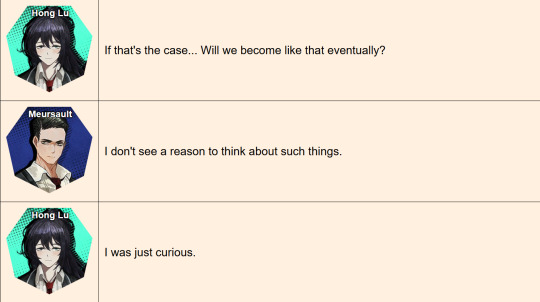

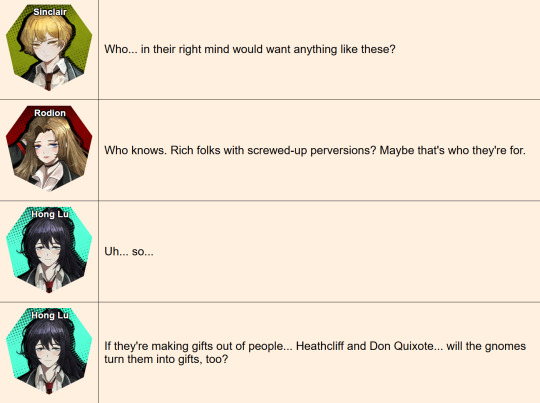
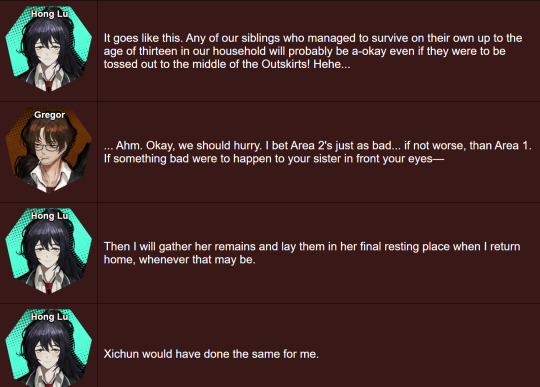
These are all examples of Hong Lu either backpedaling, changing the subject, or otherwise trying to avoid the acknowledgement of something that criticizes his status, thought process, or (in the last example) which would reveal an emotional vulnerability.
This is a fairly consistent pattern for him, and that's not even getting into the fact that the line he says when hovering over him before a skill check he has a Very Low chance at succeeding in has him suddenly try to excuse himself and leave.
Hong Lu is absolutely highly sensitive to criticism, it's just that his primary emotional reactions aren't ones we're privy to. Instead, what we get to see is how he acts to try and minimize the impact of those criticisms, if not outright find ways to never let them leave someone's mouth in the first place.
Next up - need for external validation.
This one doesn't have as many examples as the previous point, as Hong Lu is a generally closed off person who keeps a certain level of distance from most other Sinners. However, that doesn't mean I don't have any.
One such example comes from Canto 4, where soon after acting out his part in the play, Hong Lu seeks validation from Yi Sang.
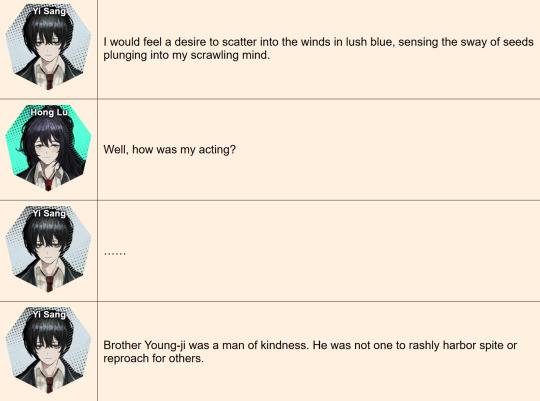
Then there's this moment in Canto 6, where Hong Lu, once again, seeks validation for something he's done.
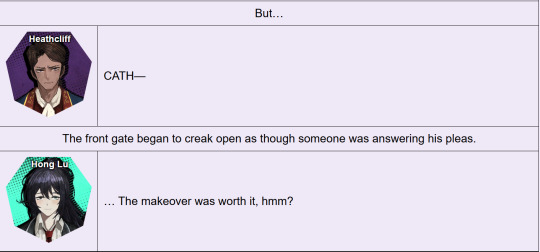
And then there's also these lines from Hong Lu's various Identities.




Aaaand then there's these base Identity voice lines, which, if you ask me, feel a bit like fishing for compliments.


This point is a lot harder to say is a definitive one, mainly due to Hong Lu's more closed off projected personality. That being said, the fact that one can find examples of it despite that is pretty notable.
And for the final one - trying to make oneself feel more special, important, or powerful.
This is one that's a bit harder to provide exact examples for, as again, Hong Lu isn't someone who talks about how he feels often, and when he does it's not always exactly trustworthy. He's not like Rodya, who while still putting on a facade, is pretty open and easy to read about how she actually feels.
But, there's still some non-mutually exclusive interpretations I want to posit here. Two, in fact.
One - I believe that for Hong Lu, the thing he sees as power is control.
See, avoiding criticism isn't the only time Hong Lu steers conversations. In fact, it's something he does All The Time. He's often the one asking questions to get the group moving, trying to gather information that might be relevant to him, and generally taking over the direction a conversation is going in. Chances are, if Hong Lu speaks up, it's likely to alter the conversation he joins in noticeable ways.
This, I think, is one of the ways Hong Lu makes himself feel more powerful. After all, it's not that hard to guess from what little bits of his background we have that Hong Lu lacked agency for most of his life. So, wouldn't it make sense for him that having that agency, that being able to be socially in control, would be the exact kind of thing that would boost his self-esteem?
In fact, the only times we see him rendered completely speechless, seemingly stripped of that confidence in conversations he usually exhibits, are in Canto 7 - specifically in scenes where he's Not In Control of what the others are talking about. Those scenes being when the other Sinners start shit-talking Xichun in front of him, and when Xichun actively tries to bother Hong Lu by alluding to the way he's been treated back at home.
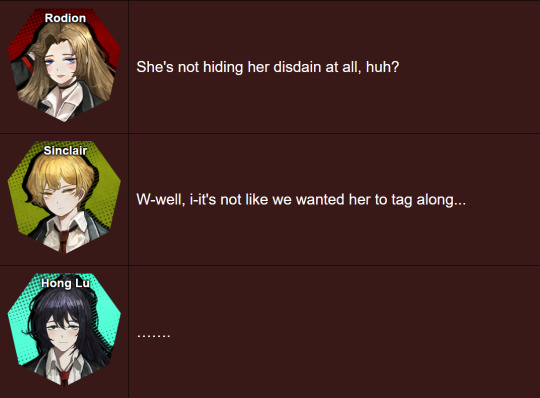

Extremely confident until something external happens that utterly strips him of that confidence... sounds familiar, doesn't it?
Then, there's the second interpretation.
See, with NPD, there are two ways a narcissist can try to make themself feel more deserving of attention. One is the one most probably think of when they think about narcissists - setting out to fulfill extremely high goals to feel amazing when one reached them and then feeling utterly crushed in the case one doesn't. This would be someone like Rodya.
However, there is also another way, one which I personally have much more experience with - to undersell. To set extremely low expectations, so that it's as hard as possible to fail reaching them, and to feel way better upon surpassing them than one would with higher, more "regular" expectations.
This, to me, is exactly the kind of narcissist Hong Lu is. Think about it. He's constantly putting out this image of an extremely sheltered person that barely understands the outside world, with notable moments where it's made clear he's Just Making Shit Up at points. Wouldn't making one seem unable to do anything, only to then proceed to do things you've led people to not expect of you, make it feel like you're much more exceptional than you really are?
The underselling goes the other way too. When the other Sinners point out something odd about Hong Lu in a more positive way, he's often quick to point out how it's Nothing compared to what his Family expected of him. Wouldn't that make one feel exceptional, to make it seem like whatever effort you're putting in to do well is but a fraction of what else you can do? That you don't even have to try to be able to be special?
...So, there. That's all the analysis and interpretation I find important to do to get my point across.
Just to make it clear, I don't think that the only thing wrong with Hong Lu is the narcissism. There's definitely a lot more shit going on in that head of his. But, I'll be honest, the NPD reading felt so obvious to me that it genuinely took me by surprise that other people don't see it.
Though... maybe I shouldn't be shocked. Some fuckers out there still think Faust is a narcissist when she's literally just autistic.
#lu speaketh#limbus company#hong lu lcb#hong lu#canto 7 spoilers#lcb analysis#gotta pull out those rent lowering gunshots every now and then
341 notes
·
View notes
Text
i didn't want to talk about this but oh my god people really love being ableist? im shocked

this video. did we already talk about how ableist this is? all the comments defend the creator and oh my god?? no everyone defending them uses the argument "but its fictional and the crew had little suplements!! thats why they drew him like that!!" pony express didn't give them a fifth cryo thing, do you fr believe they would give them DOG talking buttons? are we really comparing disabled people to PETS? for me, this comment says it all

a GOOD example of helping curly communicate is @/nakakabaliw 's comic, just like the creator of this video, they added angst, and didnt low curly to a animal. im sorry for ruining my blog's mood and throwing this in the tag, but its horrenduous how people see this and defend it
its so frustrating how people are so quick to infantilize and dehumanize disabled people. the video itself doesn't even make sense, as it would be extremely harmful for curly since his nerves are completely eposed and pressing down on them would hurt even more. im sure there are 100other ways the creator could have drawn his idea and not humiliate and dehumanize him like this. the creator ignored disabled people, as far as i know didn't apologize nor took down the video, yet people come with the "the creator is a person too" so are disabled people. its literally specified on the video title, DOG toys!!
so, summary, it doesn't make sense, is very condescending, i found more than 5 disabled people saying its uncomfortable for them.
just because mouthwashing is a horror game doesnt mean you can do horrendous stuff too
#sorry for my bad english#sorry for the rant#mouthwashing#curly mouthwashing#mouthwashing game#wrong organ#mouthwashing curly#its so sad to see stuff like this
150 notes
·
View notes
Text
From Zutara to Sokkla - Narrative Framing and Hypocrisy
Something that boggles me about the fandom is the complete double standard between Zuko and Sokka vs Katara and Azula.
A pretty noticeable example is how we frame the infamous “I’ll save you from the pirates” scene versus the Day of Black Sun.
The infamous pirates scene is often lauded (or condemned) as the birth of Zutara. Fans allege the tension between Zuko and Katara is palpable, and that their attraction is clear.
But let’s consider:
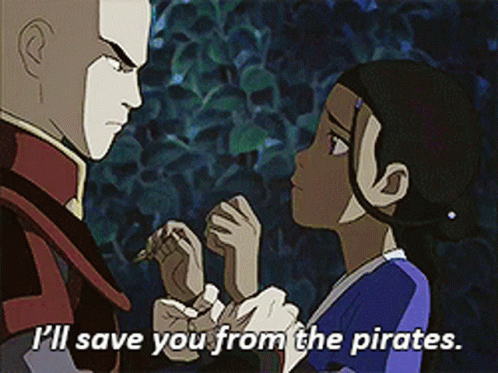
Katara isn’t a realized bender yet. She can’t defend herself. She’s surrounded by hardened adult criminals with weapons who have it out for her, and two firebenders (like the man who killed her mother!) who have been pursuing her doggedly, one of whom has shown he is quick to use violence even against civilians and the elderly.
Zuko dangles Katara’s necklace in front of her, the only item she has left of her mother, and threatens to take it away forever if she doesn’t sell out her friends.
If you want to read romance in this harrowing scene, feel free. It’s fiction and I’m not the morality police. Have fun!
What bothers me is the hypocrisy in how people frame this scene by comparison:

Consider this: Azula can’t bend. She’s unarmed. She’s pinned to the wall and has no means of escape. Her enemy is armed, is the architect of this invasion, has an army outside ready to follow him, and is currently flanked by an unstoppable earthbender and the friggin Avatar!
Azula is using herself as bait to protect her father (and ostensibly Zuko) knowing her life would be in terrible danger for minimum of 8 minutes. During which the enemy can do anything to her. The Fire Nation has done a lot of harm and there are surely many soldiers out there who would love to take their revenge on the Fire Nation’s pretty little princess who conquered the “impenetrable” capital of the Earth Kingdom.
The show goes out of its way to inform us that Azula is an expert at hiding her emotions. She can even fool Toph’s lie detector. Why?
Many people misinterpret this as a sign that Azula is an emotionless sociopath or whatever ableist pop-sci ideas they have about ASPD.
In reality, it’s the opposite. Azula being an expert at hiding her feelings is made clear so that we understand why she doesn’t look terrified, or vulnerable, or sad, or hurt until the finale when she finally cracks and her facade slips.
All she has at her disposal to protect herself is her wits (she had a knife and some Dai Li, but she has neither by this point). She smartly uses what she knows about Sokka to exploit his weakness and buy herself time. She’s so good at getting under his skin (which takes a sophisticated level of weaponized empathy) that even after he figures out what she’s doing, Sokka still can’t help himself.
This is all she can do to protect herself and her father. We as the audience know that Sokka and Toph aren’t going to kill or maim her, but Azula doesn’t!
So why in the world was this scene received as traumatic for Sokka?
Fans will claim that Azula’s mind games in this scene left Sokka with lasting trauma. That this is emotional abuse.
But who is the one pinned to the wall with no way to defend herself? Who is the one with weapons to threaten her with, and powerful allies who have it out for her?
If Sokka experienced any lasting trauma from this altercation, he sure never showed it! Sokka never seems to think much about Azula at all outside of wanting a rematch when it’s presented at the Boiling Rock. And even that is due to his feelings of inadequacy after the invasion. He even makes fun of Suki for being captured by Azula! Doubt he would do that if she had genuinely been tortured or if Sokka had been so traumatized by this scene.

Suki: Are you trying to get on my bad side?
Meanwhile, Katara does seem to have lasting trauma over her repeated altercations with Zuko. She talks about how he chased them all around the world threatening them. She refuses to trust him after he betrays her and fears he will get Aang killed. Zuko did hire an assassin.
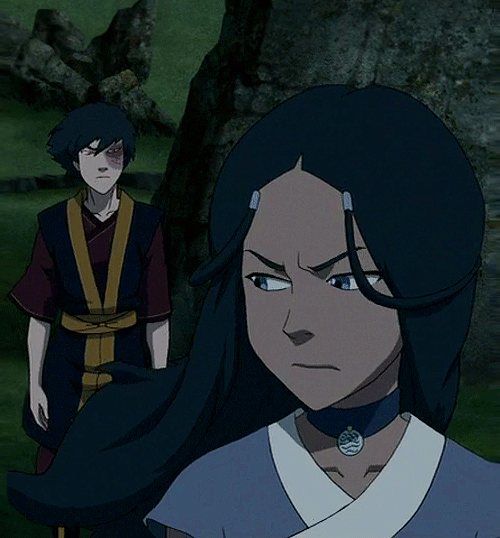
In what universe can we read Zuko and the pirates threatening a helpless Katara as “romantic” but the scene with Sokka and Toph threatening a helpless Azula as “traumatic for Sokka”?
Only a universe where we have already subconsciously decided we are on Zuko and Sokka’s side.
These scenes can only be read that way if we have already decided Zuko isn’t that bad regardless of how Katara feels about what he does to her, and that Azula is pure evil regardless of what anyone does to her.
It’s a world where both Azula and Katara’s feelings are ignored.
If you want to read the pirate scene as romantic? Have fun. Enjoy your fics. It’s all good.
But let’s not pretend Zuko is some pure woobie in this scene that just needs some Katara loving, while Azula is some fearless psychopathic monster that enjoys putting herself in danger as long as she gets to “abuse” Sokka.
There’s a reason these two scenes exist this way. Katara and Zuko are parallels just as Azula and Sokka are. Katara and Azula are foils just like Sokka and Zuko are.
Fandom can and should do better by Katara and Azula. They deserve just as much consideration and empathy for their suffering and unmet needs as their brothers do. Even if Azula was a villain - so was Zuko for most of the show!
And as a pretty consequence, I can say this: Zutara and Sokkla are equally viable.
Goodnight, shippers.
347 notes
·
View notes
Text
There's two types of people who use transandrophobia to decribe transmascs' and trans mens' experiences:
- Simply specificity, language used to hone in on a specific way being trans affects people who just happen to be men
- As both the above and as a springboard to discuss how societal misogyny, radical feminism, gender stereotypes, and bioessentalism affect all people who can be pecieved as men or masculine by others, and how bigotries compound in meaningful ways with stereotypes and bigotry surrounding maleness and manhood
Like. Half of you are saying "maleness is a hollow experience which is standard, and exists in opposition to gendered oppression, and transandrophobia is therefore when dudes experience misogyny and transphobia"
and half of you are saying "Being percieved and/or transitioning towards male uniquely affects how I am treated, because, for example, how people perceive my blackness or mental illness or kinkiness or femininity is compounded with my manhood in ways that don't usually happen to gender conforming cisperi women"
Which are two fundamentally different approaches to transandrophobia as a concept. One suggests that maleness is a simple downy layer of privilege that coats a person through their male life, and the other acknowledges that a man (or somebody perceived as masculine/male) can experience oppression in ways that those NOT perceived male may not.
Only one of these interpretations is intersectional. Black individuals who are policed more hashly when interpreted as masc know they are risking dangerous experiences when transitioning to male, as has been discussed before on here (to no avail). Male or percieved male people with personality disorders are treated as more dangerous than women with similar symptoms, and are sometiems diagnosed with different disorders entirely based on percieved gender differences. This affects transmascs too, especially considering the already dire state of queerness in psychiatric institutions. Being a male birthing parent is a whole shitshow of transphobia because men are not supposed to give birth, and transmascs are lucky to access related healthcare at all, let alone access it without being ceaselessly misgendered and treated as a stigmatised 'other' to deleterious affects on parent and baby. These are just a few examples, there are many more ways maleness can screw a person over. And that's not to say that female privilege is a thing instead of male privilege, but rather to emphasise that men are not supposed to be minorities. Men are not supposed to be assaulted, men are not supposed to be outliers, men are absolutely not supposed to be trans.
When a man is autistic, he's not just autistic, he's an autistic male, and that makes him more likely to be killed by cops (especially if black). When someone says "you claim you're not ableist but you're scared of the homeless x on a bus talking to xself", they always say the person is a man, because that sounds more significant (and cops think so too). Consider when a person's rape/abuse is considered to not be all that serious due to the victim being male, or when a man's attraction is considered to be more exploitative than a woman's, or when a fat man is considered more creepy/sexist than a thin man or a fat woman. Consider why so many caricatures of evil and creepiness are men with deformities. Consider the fact that men's bathrooms don't have baby changing tables, and that a man may get less support from others after their child's death than the mother might. Maleness can negatively compound with things like minority status, vulnerability, aggression, sexuality, etc. in ways that screw that person over, both in social spaces (such as queer communities that dislike/distrust maleness and masculinity, or how isolation affects men harder), and in more tangible ways, like their rates of suicide and being murdered.
There are tangible ways in which transitioning to male can negatively affect a person's life even if you remove (hypothetically, not really possible) the transphobia element, and these also constitute as worthwhile topics of discussion. If you think maleness is the lack of gendered oppression, then you're not intersectional in your feminism at all. If your life as a male is genuinely sunshine and rainbows (apart from the transphobia if trans), then good for you, genuinely that's great, but not everyone lives in a radfem fantasy world.
Being unable to tell the difference between men talking about mens issues/liberation, and right wingers talking about oppressing women more, isn't feminist. It's ignorant and antifeminist. (MRAs don't care about actual mens lib, and are actively worsening it because they are sexist and opposed to gender lib. You guys know that, right? That male and female liberation aren't oppositional or binary, but the same gender liberation that is entirely oppositional to patriarchy?)
These men and mascs talking about issues facing men aren't ignorant womanhaters who deny misogyny and want ultraprivileged men to be coddled, they are good faith members of your community with experiences just as varied and valid as yours. Treat them like it.
#“men can't handle having privilege” mfs when they realise they experience less lethal violence in a police confrontation#when their cancer treatments aren't inaccessible. when they don't have to fight for custody of the kid they gave birth to#“sexism doesnt affect men. i am very smart and well read. minorities trust and like me”#the people who think the existance of misogyny means men don't experience sexism are gonna have a real one reading this lmao#you may now make shit up about me not believing in female oppression or something#go ahead. put a bunch of words in my mouth. i won't reply#transandrophobia#transphobia#intersectionality#mens liberation#you'd think people would be more open to the idea that being percieved male can screw someone over huh#but no. back to essentialism and talking about aspects of living human beings like they're pokemon strength/weakness charts#“if men have issues then that implies women aren't oppressed” <- weirdly common opinion. also oppositional sexism and black n white fallacy#like. this is 101 feminism stuff. this isn't a bold new rare take on maleness. it's just thats sexism is popular on tumblr#this has been a known take for generations of feminism you just flatten men into a vaguely oppressive force#trans rights#intersectional feminism#mens issues#plus testosterone is so controlled that DIY is almost impossible and will get transmascs thrown in jail#my custom trans tshirts should come today#i'm mocking the hypothetical sexists in the hypothetical replies but genuinely i think mens lib is having a big hayday on tumblr now. yay#i love us all#stay safe#i hope this is coherent. it's not exhaustive and it's super long lol
44 notes
·
View notes
Text
Reminder that Stirringjuice/Ven themself has said that TMC is not fetish content. Kister’s works are NOT an extension of what was described in the allegations document. If you don’t want to consume TMC content anymore, fine (best you don’t— not in a way that gives Kister money anyway), but don’t spread misinformation.
EDIT: after rereading Ven’s callout document and finally being able to access ALL the screenshots he attached, I have decided that I will no longer support him. I will not go back to supporting Alex Kister yet, but I cannot support a blatant ableist transphobe either. link to annotation doc: (not mine) https://docs.google.com/document/d/e/2PACX-1vReErDatnpQ_h3W-WlqrmzmPN26-UyDwLVwBKmHV09WhVZtdZQM44HRxvoV0ZTz8Ho-NaBVKYxjNuha/pub
Things I will be addressing:
Why I do not support Ven (separate from other victims)
Stuff that Alex Kister DID do wrong, even if the allegations were exaggerated/faked/done out of malice
The allegations and victims themselves.
WHY I DONT SUPPORT VEN
First of all, this ⬇️ (scroll down its below the blue highlighted ss. Formatting issues sorry.). This is a ss of Ven’s (now deleted, now archived post) response to how many people are calling him transphobic for his transmisogynistic comments in his document, and how he had basically outed Alex. Instead of saying something like “it wasn’t transphobic — I had to out Alex— it was necessary for the victims/proof/whatever”, Ven just says that if Alex didn’t want to be outed or subjected to transphobia, he shouldn’t have been a “groomer” (Ven later says that he had misused the word “groomer”. Everyone that Alex had interacted with in a sexual or romantic manner had been an adult, and had fully explicitly VERBALLY consented.)
However. Even if your opponent is a bad person, you do NOT have the right to be transphobic. EVER. criticize them on whatever they’ve done wrong, hold them accountable in a balanced and civilized manner— etc. Being protected from bigotry/ not getting misgendered, privacy, legal counsel— these are all examples of RIGHTS.
When you start denying something based on whether someone deserves it or not, that “something” has become a privilege. By stating that his transphobia was excused because Alex is a supposedly bad person, Ven has stated that not being subjected to transphobia is a privilege. here’s the link: (takes forever to load the keep reading portion but it works for me) https://web.archive.org/web/20240317125855/https://www.tumblr.com/stirringjuicee/745117180204548096/alex-kister-and-actively-using-being-trans-to-lure
Screenshot of the post below, along with something from the callout doc (annotated by a tumblr user. The non-highlighted color text is the annotated bit.
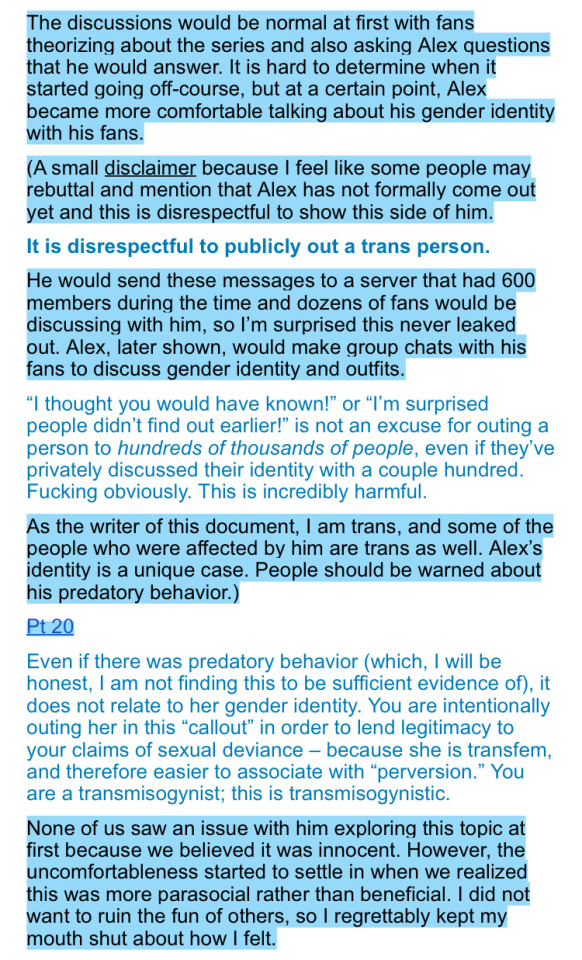
—— ss from ven response (click. It IS An image it just looks like text)
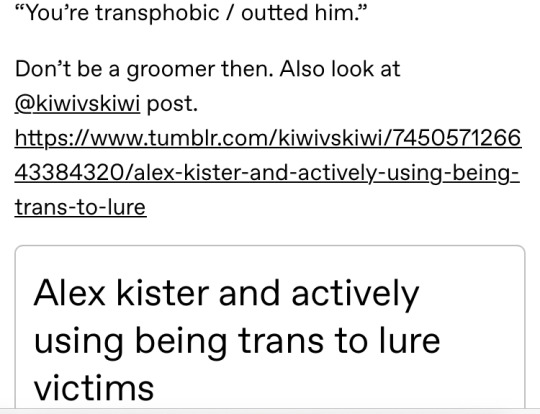
—- now onto some more details.
Ven, or StirringJuice, made the first allegations document against Alex Kister. He had stated himself that he does not consider himself a victim, just a friend of the victims who wanted to spread the word. Ven starts the document off by describing his past relationship with Alex Kister. He also includes screenshots of text messages from Alex— which often contradict or have no relation with what he’s saying. This is why it’s important to look at the screenshots, guys! Most of the toxicity in Ven’s relationship with Alex stemmed from Ven’s refusal to honestly his boundaries or feelings. He told Alex that he was comfortable with the sexual comments, he told Alex that he was comfortable being just Friends with Benefits, and he told Alex that they were welcome to vent to him any time <- all of this is corroborated by the text screenshots that Ven himself posted.
In Ven’s text messages, we can see him suggesting that Alex gets a therapist. Great! Nothing wrong there. And then you actually look at the ss:
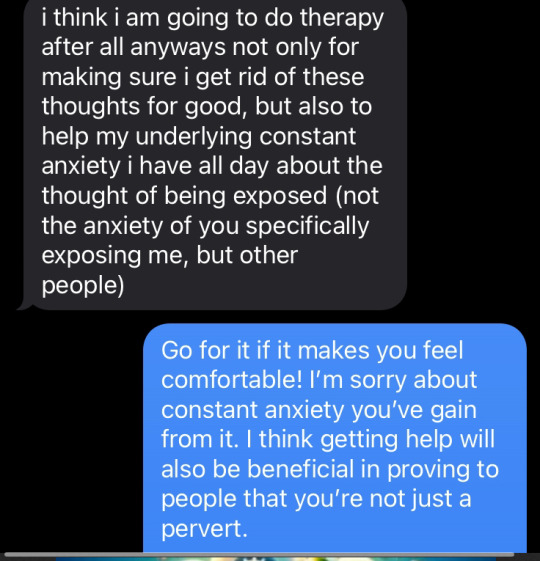
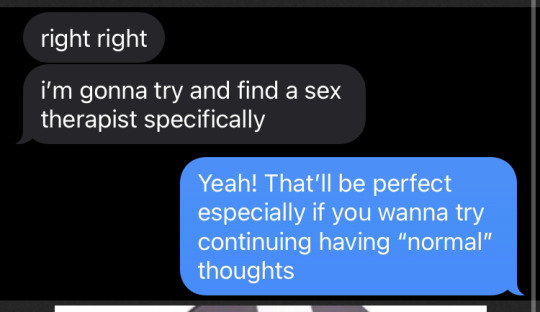
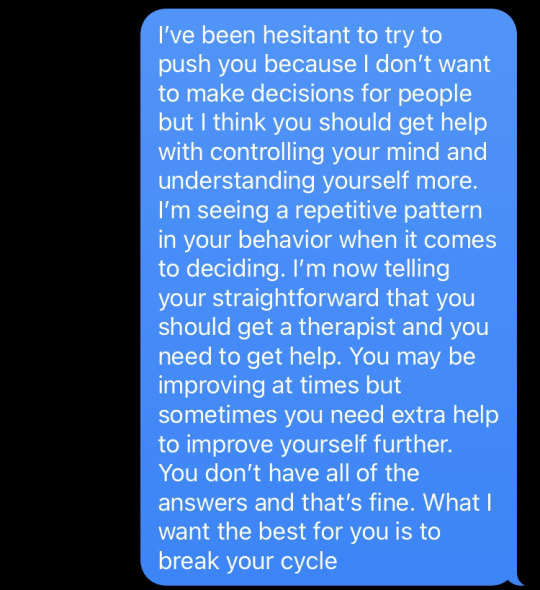

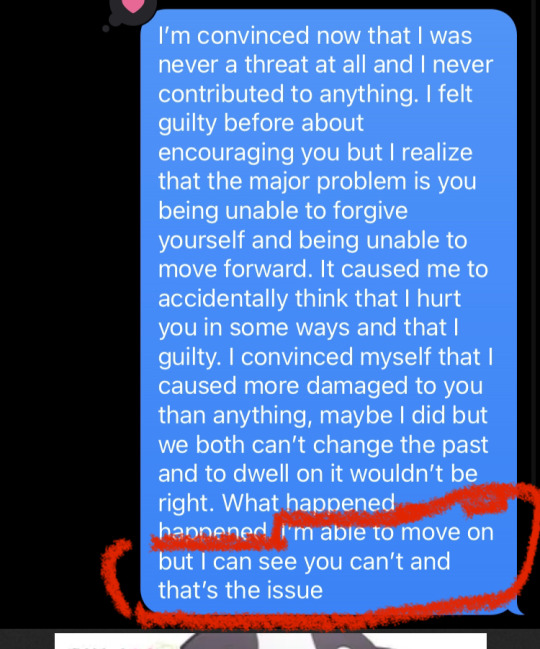
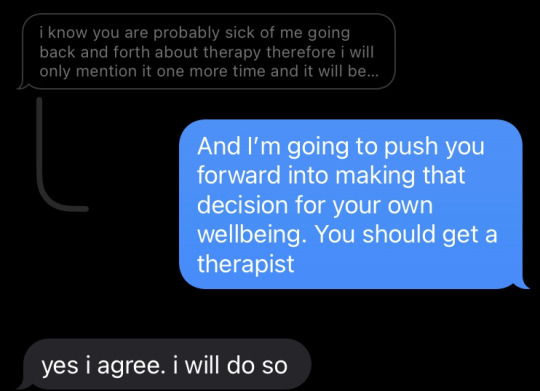
(Ven is the blue. These ss are linked in the callout document.)
First of all. You cannot force ANYONE to get mental help, regardless of whether you think it’s for their own well-being. If their behavior is harming you, leave. But even the worst people on earth deserve autonomy for these kinds of things. Ven literally states that he had FORCED Alex to get a therapist, and you can see him admit it in the messages above as well.
after these ss links (labeled part 9 in the doc), Ven hits us with this absolute banger:
“[Alex] then decided to go off his meds.”
Someone had already said this, but: YOU HAVE NO RIGHT TO SAY THAT TO OR ABOUT A MENTALLY ILL PERSON. EVER. REGARDLESS OF WHO YOU ARE, OR WHO THEY ARE. it’s an insult to every mental health community.
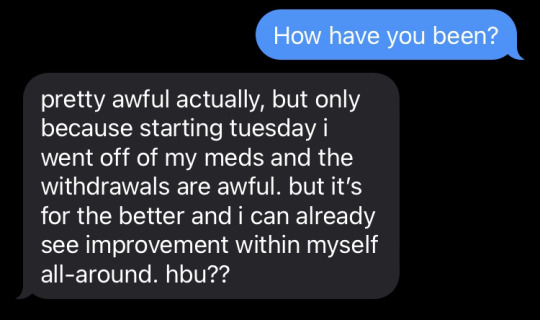
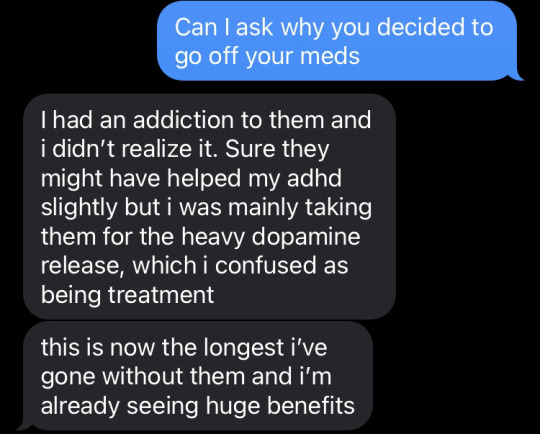
^ also, Alex gives a pretty good reason for going off his medication. Not that they needed to.
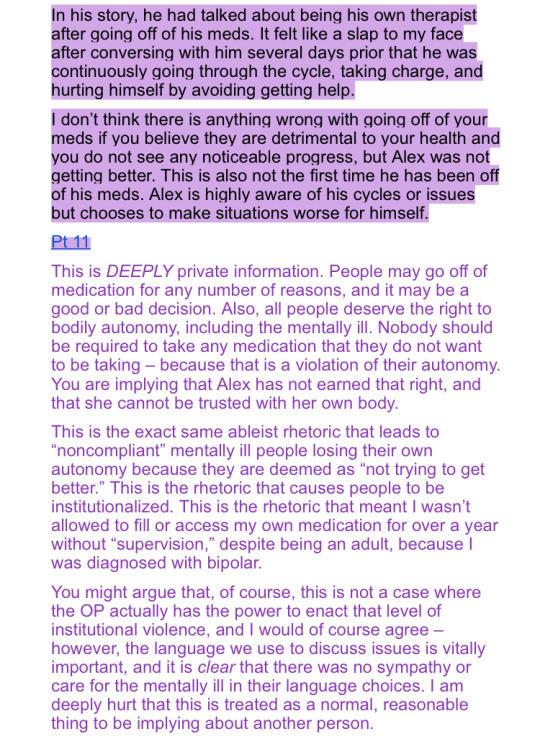
^highlighted text is Ven’s callout post. Purple text is a fellow tumblr user’s annotations. They have a whole post with these annotations. I’ll credit them when I’m done writing out my post. [clarification: the annotator uses “she/her” pronouns for Alex, Ven uses he/him. I use they/them because Alex was never publicly OUT as she/her before they were outed, so I’m not sure what to do]
Also: please go on the callout doc and see the “pt. 11” screenshots yourself. There’s a lot of them and I don’t want to add them here, but please go see them.
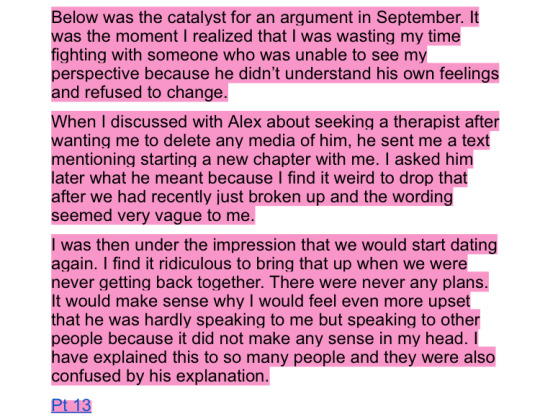
^Ven hears that Alex wants to start a new chapter with them (yknow, like redeem the toxic relationship they’ve had) and immediately assumes it’s in the romantic sense.
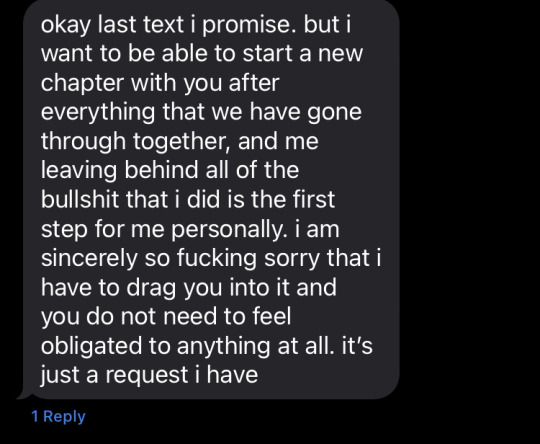
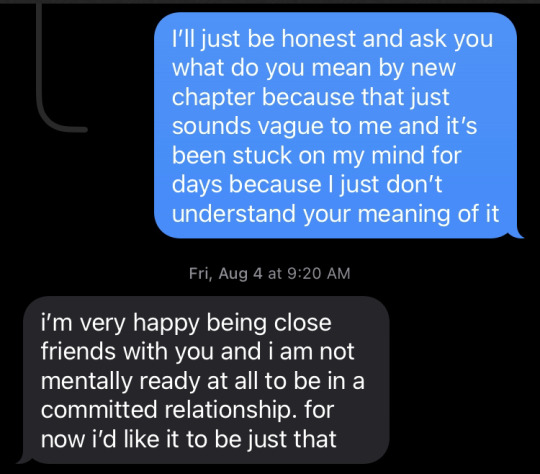
^Alex admits that they are not ready for a committed relationship, a good first step for smoothing over any toxicity.
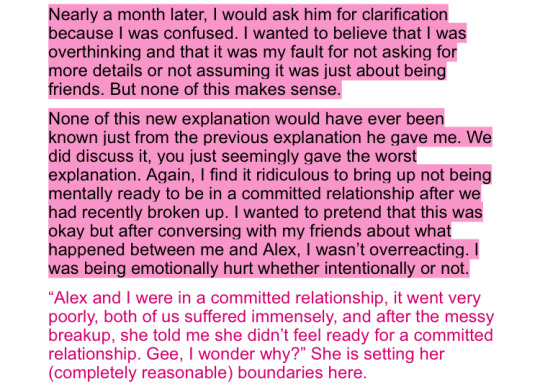
^nothing else to add. Annotator did great.
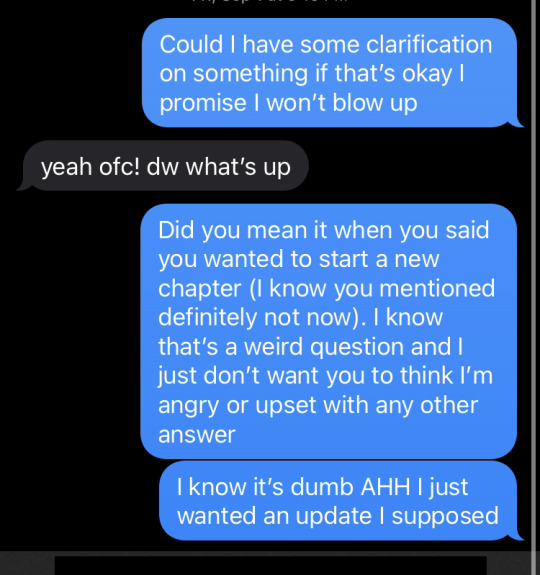
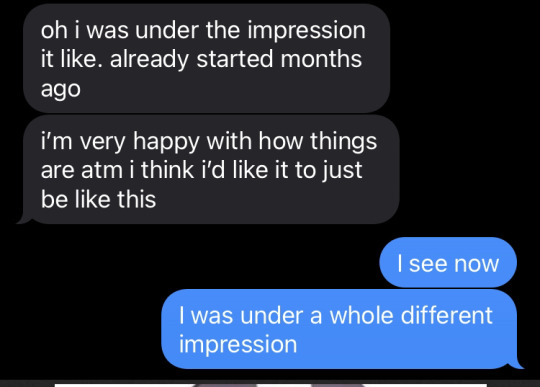
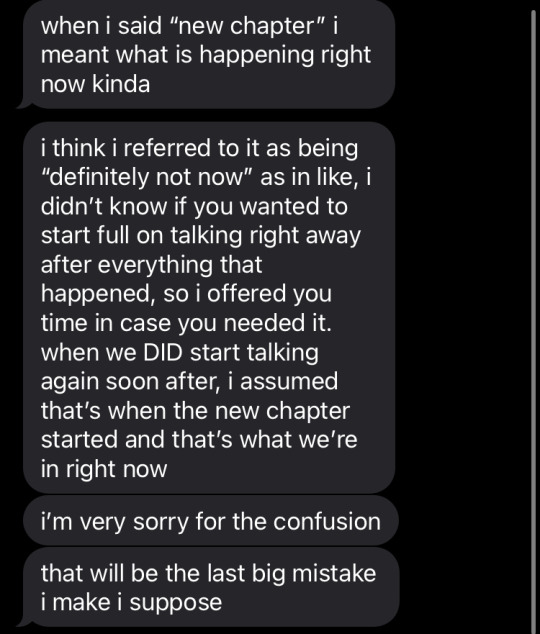
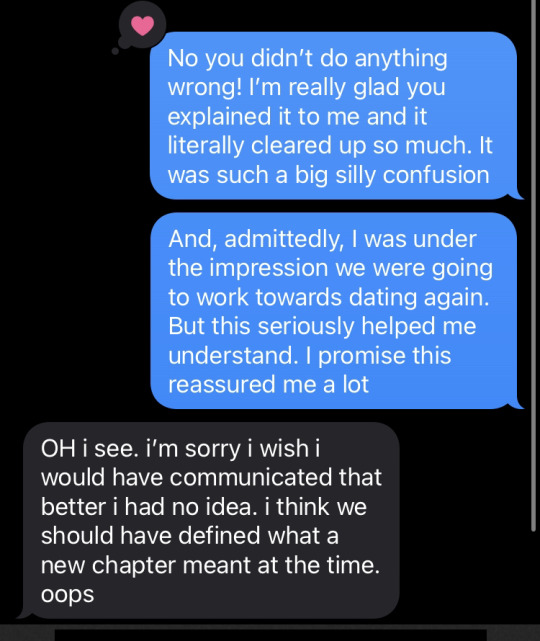
^ text ss as listed under the “pt. 14” link
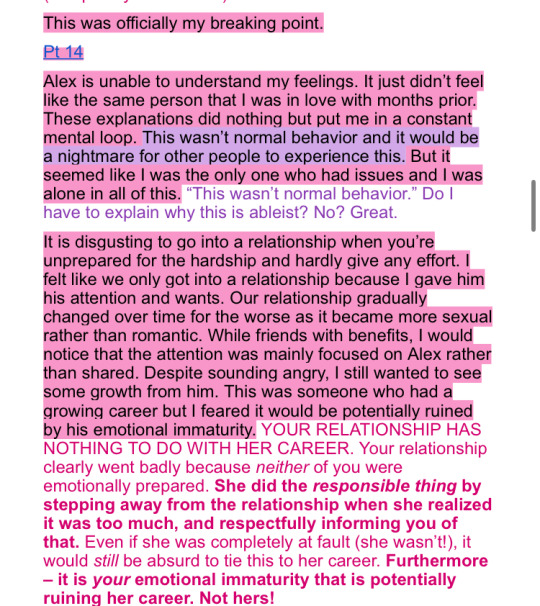
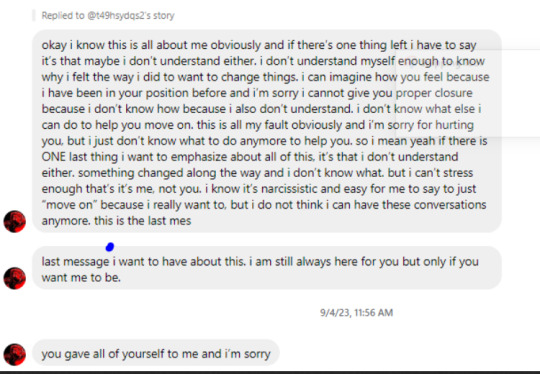
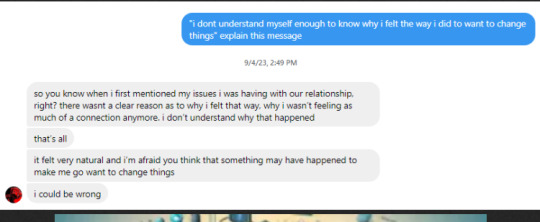
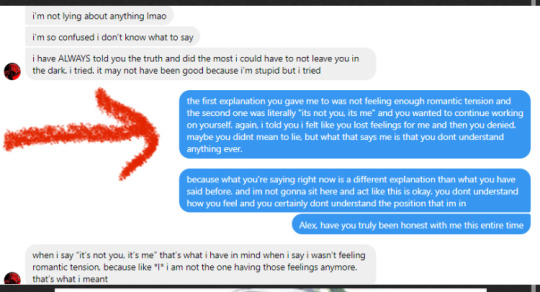
These are 3 out of 10 ss under the Pt. 15 link. Look at the text indicated to with the red arrow (drawn by me). Ven literally tells Alex that they “don’t understand anything ever.” They also tell Alex in a later ss (plz find it yourselves because I’m not posting all 10 photos) that they “don’t understand [their] own emotions.”
Maybe Alex was making an unhealthy decision by continuing to reach out to someone they clearly had an unhealthy relationship with. But these responses are borderline abusive, especially when aimed at someone who suffers from paranoia.
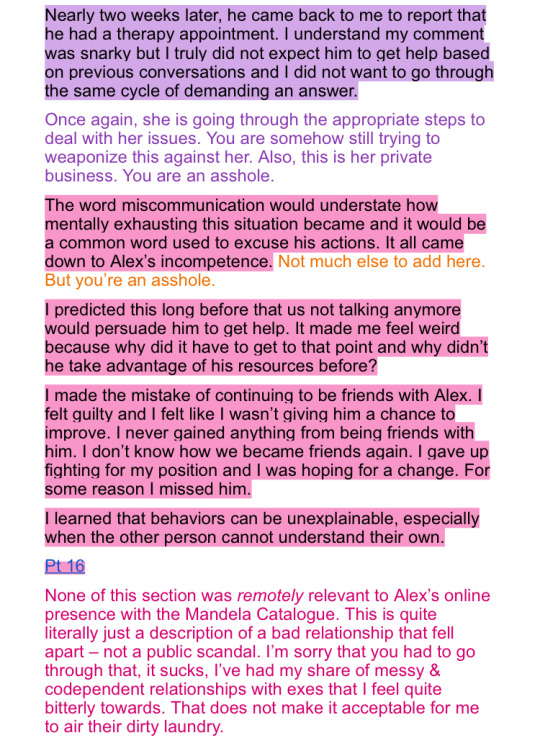
A huge chunk of the entire callout doc is Ven venting about his relationship with Alex. This relationship is not abusive, it is toxic on both sides. The fact that Ven put this much focus on these barely relevant details— even when the topic was the victims, not Ven himself— suggests that he did this out of petty vindictiveness. If the allegations are true, the victims deserved a BETTER PERSON and a BETTER FRIEND to share their story. Not someone who did it purely because it was en excuse to get revenge. If it wasn’t revenge, why add all these details?? (funny thing— the whole doc. Would be more believable if Ven hadn’t added all this stuff. He destroyed his credibility before even getting to the allegations).
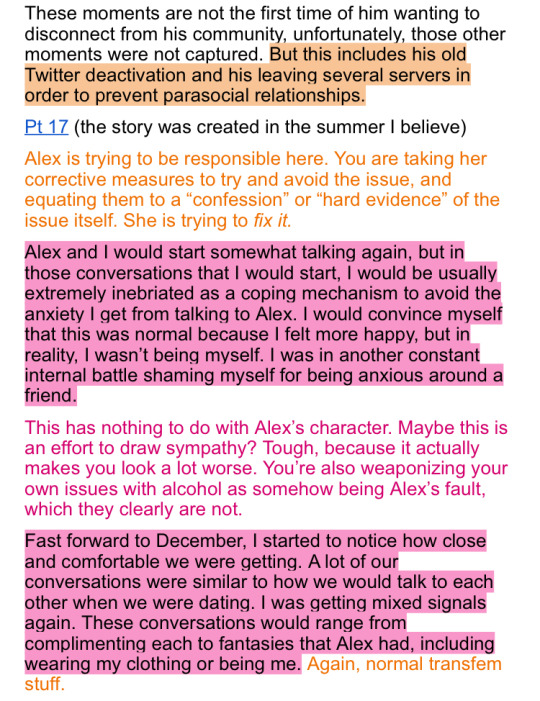
the one below has more transphobia and general assholery than ableism.
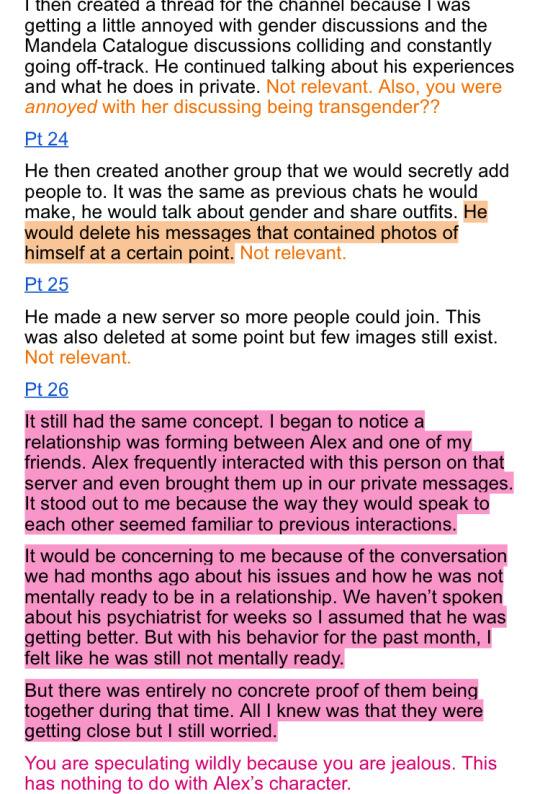
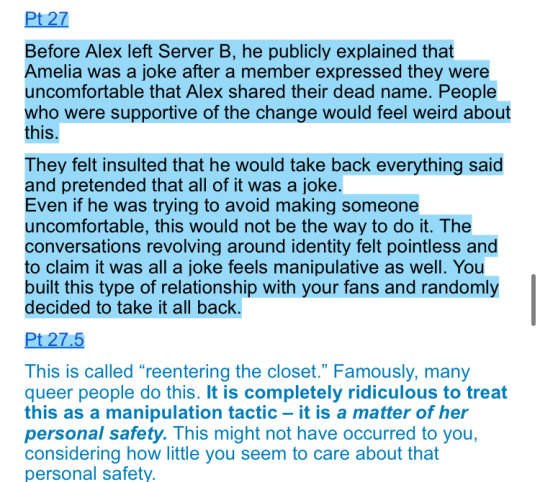
^apparently once you are out of the closet, you are not allowed to go back or feel ashamed. Else you are lying and manipulative. Thanks, Ven.
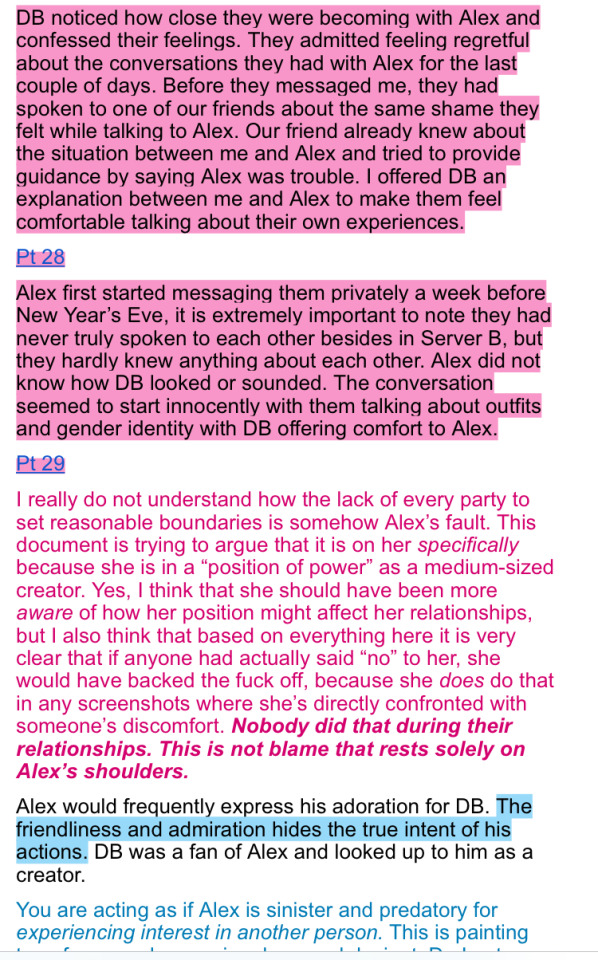
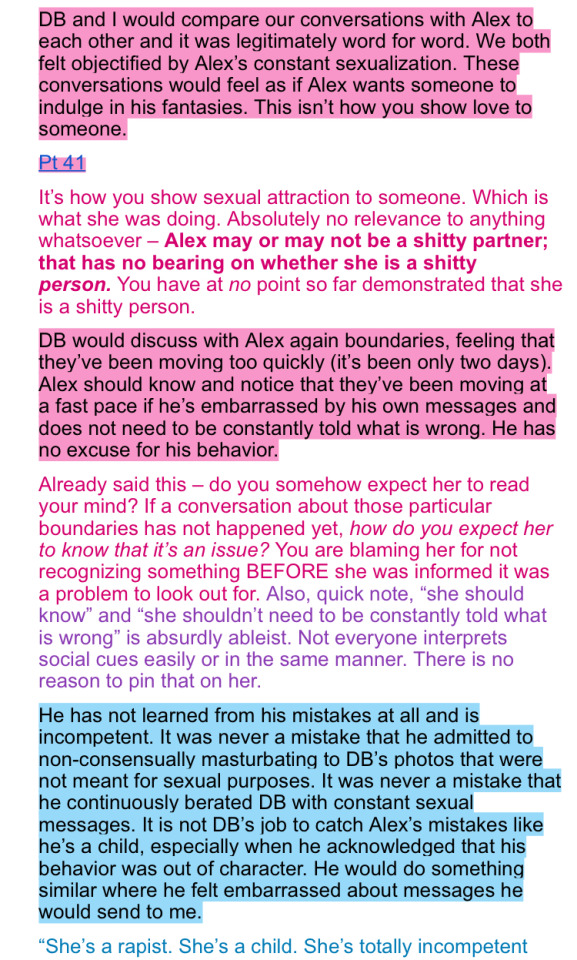
I am done posting screenshots from the annotation document. Please, PLEASE read it in full. I will tag it in the comments. There are so so so many good points.
STUFF THAT ALEX HAS DEFINITELY DONE WRONG, REGARDLESS OF WHETHER THE ALLEGATIONS ARE TRUE OR FALSE:
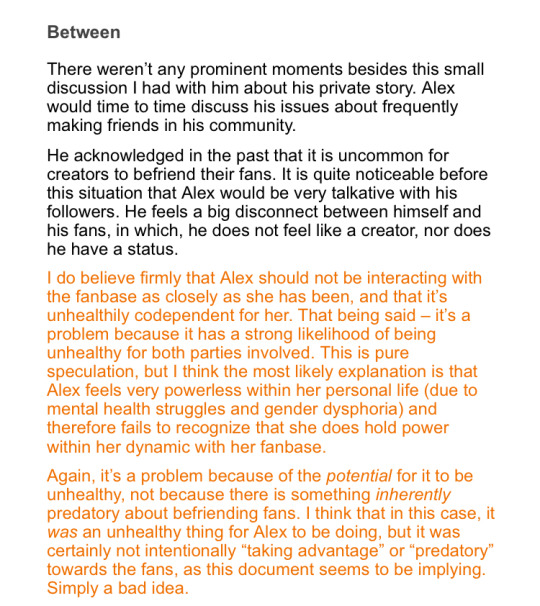
(Orange text is annotator, black is original doc).
Venting to/ Relying on a minor fan for mental health support (I think it was Mitchie). That’s not good.
making allusions to suicide during their relationship with Ven. Joke or not, that’s unhealthy.
ALLEGATIONS/VICTIMS:
wont say much here because I’m getting tired. some people on Reddit have been pointing out that some discord ss (not the ones I’ve shown you, those were imessage ss) look faked because there is use of military time, which is not an option on discord apparently. Other screenshots seem to use different fonts as well, further indicating forged evidence. I have fact-checked none of this and can’t verify it (not that you should be relying on my word alone, anyway).
I do not support Mitchie, since they’ve been telling people to self-harm and/or commit suicide when they point out flaws in the callout doc. I don’t care what you’ve been through. There is no excuse for that.
As for the other victims.. I find their statements fishy. However, I will not disbelieve them until more has been cleared up.
#mandela catalogue#the mandela catalogue#tmc#alex kister#alex Kister situation#fuck alex kister#tmc cesar#tmc mark#tmc gabriel#tmc au#tmc adam#tmc fanart#the mandela catalog fanart#thatcher davis#cesar torres#mandela catalouge fanart#adam murray#alex kister callout#alex kister drama#Not a big fan of how gender identity struggles are tied so closely with the actual grooming. Because. They are completely separate.#Kister’s gender identity struggles have nothing to do with their choices and I’m not a fan of how it’s been handled (based on what I’ve see#I use they them for kister here because they weren’t technically OUT as transfem#So idk if they’d be okay with people using she/her#If I were outed I wouldn’t want people to use pronouns that only a select few were meant to know. But maybe that’s just me.#No hate for those using she/her for Alex.#If pronouns are cleared up I will fix this
143 notes
·
View notes
Text
Heaven is "corrupt"
I really don't like that the angels don't know any qualifications for what gets a person into heaven, because to me atleast it doesn't make a whole lot of sense when thinking about one of the biggest plots in Hazbin Hotel. Heaven being corrupt is an interesting premise the show never really uses and the qualifications for getting into heaven being unknown is just another example for that.
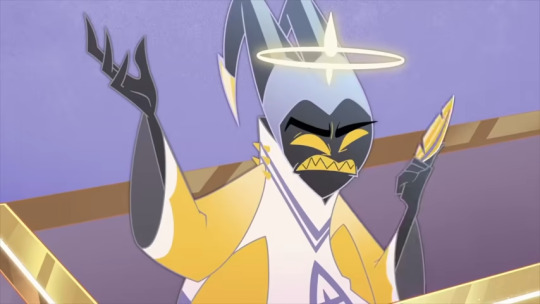
How are the Angels supposed to be corrupt/judgemental/discriminative if they don't even have influence over who gets into heaven? That just brings up the question of how people go to either heaven/hell in general. I always assumed there would be something similar to a court room, where peoples behaviour on earth is judged and where it's then decided, where they deserve to go. This would support the idea of heaven being corrupt if the angels (and only the angels) have super high, potentially homophobic, racist, ableist or sexist standarts and basically have full control over where someone ends up. But the fact that no one knows real criteria for getting there sort of debunks that idea, because if there was a court (or something) they'd know the rules they decide by.
If no angel knows about any criteria, then how are they corrupt opressors, if they aren't even the ones deciding over who gets remorse and who doesn't. At this point, the only bad or corrupt angel there is is Adam (I guess Sera could also count because she is aware of what Adam does) because no regular angel knows the exterminations are even happening. But didn't the show pride itself on being a critique of christianity? Like the whole of christianity? The concept of christianity and problems it leads to in the real world?
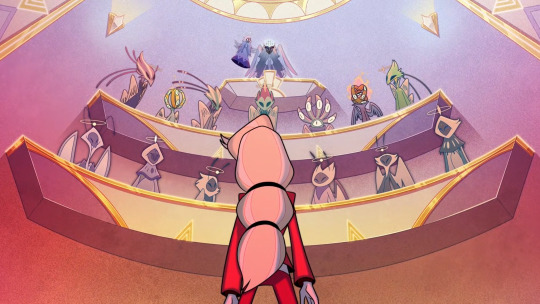
It seems very lazy to basically introduce us to the one (two if you include Sera) actually possibly corrupt character(s) and then introduce a concept that makes every other angel somewhat innocent/reasonable.
They didn't know how they ended up there, all they know is that they were a good person and the show never gives us reason to assume that the angels were in general bad humans, because guess where all the characters end up who are actually corrupt/terrible/evil even. In hell.
Hazbin Hotel wants Adam to be bad by assuming that the people in hell are terrible, which I guess they want to make seem even more unreasonable by making him not know how people end up in hell/heaven. But to be honest, when looking at how hell is introduced by Charlie in the opening song or how the people down there generally seem to act, I would assume hell to be filled with awful people who maybe just deserve death as well. I know it's probably not everybody and just going down there and killing random demons isn't good ofc but the show does such a bad job of supporting the whole "heaven is corrupt" idea.
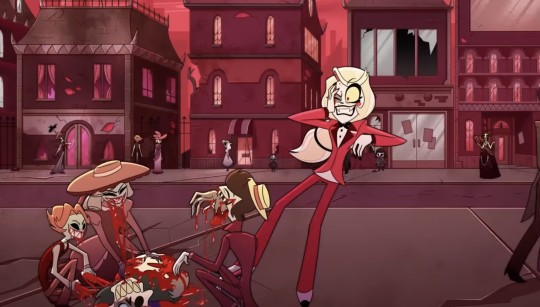
There isn't one demon we've been introduced to that doesn't deserve being down there or that would've gone to heaven would it not be "corrupt".
This might be a little side rant, but the idea of redeeming a sinner is also so underdeveloped. The show never acknowledges what the characters did in the real world even though you'd assume that that plays the biggest role in how they can be redeemed. But just in general, does Charlie even have an idea how to redeem someone? All the "work" she does in HH is just more general trust exercises and very basic ideas of sharing and being kind ig, but what does that even have to do with bettering these people?
For actual, personal betterment she'd need to understand what makes them flawed or bad people and what got them into hell in the first place. A greedy sinner or someone who lied a lot in their real life would probably need to realize why lying is bad and people need to share and then they'd use that new understanding to actually change, which would then lead to them having genuine character development. But how to you redeem someone who did one bad action? Someone who maybe cheated while they were on earth, didn't regret it and now wants to change in hell. You could assume that anyone who was in a relationship before would understand why someone would be mad about cheating but then how do you change them from there to be able to go to heaven? Or, since heaven is pretty "corrupt" it would make sense if they were homophobic. Like, you can assume that anyone who is queer ends up in hell (if the show wants to stick with it's "heaven is bad" idea at that moment), but how do you redeem someone like that? Make them become heterosexual/cisgender? That obviously wouldn't work.
At this point there is not a single idea on how redemption actually functions and none of the characters help us explore that. Sir Pentious' redemption is really rushed and we don't even know what he did to go to hell, so his character arc feels very ingenuine. Angels character development is also hinted at, but is used as an example to show how no sinner just gets into heaven easily (which sorta contradicts Sir Pentious' very rushed and flat/simple redemption). And also, no sinner has ever redeemed themselves ever from what we can assume, before Sir Pentious. Charlie seems like a coward for basing everything she cares for (the survival of "her people") on the concept of something she so obviously doesn't understand/have actually any proof of working out for. And the sinners in hell just really being bad people does not help to make heaven seem unlikable.
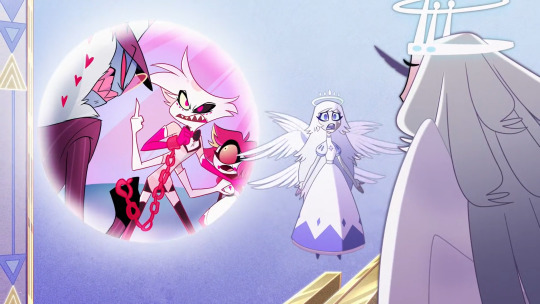
What if Angel Dust wasn't in the mafia or a drug addict and was instead just a regular person who happened to be a sex worker and drag queen. They could've used that to show how discriminative and judgemental heaven is by not allowing him in even though he was a good person.
What if Husk was a regular bartender who just did his job and tried not to cause trouble. But one time, a drunk person tried to abuse someone and Husk hurt him in return. That could show how just one tiny slip up leads to being cast away, even if you were good your entire life (I guess working with alcohol wouldn't work then, but he could also be a cashier or something) or also how it's maybe unfair to judge something done for the protection of others/yourself.
Or Nifty could be a victim of abuse in the real world who was surrounded by people wanting nothing good for her her whole life and this abuse is the reason for her "crazy" attitude in the show. This could support the idea of people being "bad" because of their surroundings, but being judged/mistreated instead of getting support, even when they seek out that support.
None of this happens tho. All of the sinners we encounter deserve to be in hell and they don't generally care to be better. In the pilot (however canon that might still be since Viv can't make up her mind apparently) we see that criminals from our world are in hell as well. Like Jeffrey Dahmer and from that, we can assume just what kind of people go down there (like pretty much every war criminal, dictator, opresser you can think of is probably in hell there, if we are to assume that the earth in HH/HB is supposed to be our earth mostly).
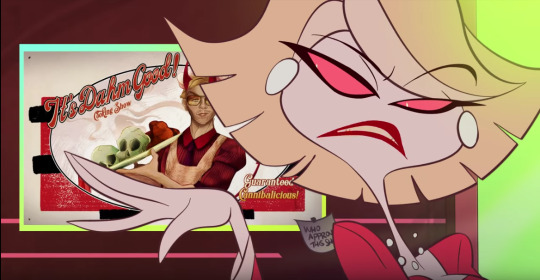
The only demon that doesn't apply to, the only one you could argue is in hell undeservedly is Valeria (and even that is debatable). And Valeria isn't even a demon. She was born in heaven, raised to believe that the sinners are the people she has to kill, without anyone ever giving her a different perspective. She was simply raised to be a killer first and foremost and in the one moment she showed care for a sinner, she was cast out and seemingly left to die.
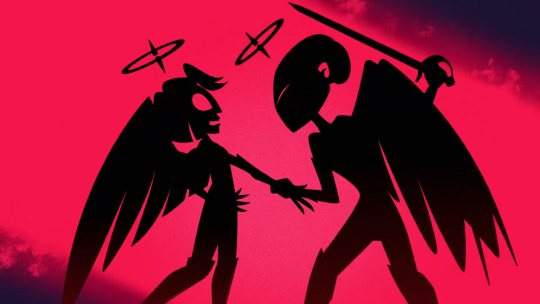
The only "demon" who was actually affected by heaven being "corrupt" (in terms of getting into hell) isn't even a demon, but a heaven born. An ex-exterminator who also killed people. And you know who that also applies to? All of the other exterminators. All of them who are just raised to kill and don't get to ever be anything else mostly, until our "heros" (who are all for supporting moral greyness in another scenario) get to kill them in the finale. Because they are evil and bad and don't have potential to be better which is why Charlie will just let them be killed, even though she is the one who knows best that exterminators can change, because she is literally in a relationship with one.
In that sense Adam really comes across as the only corrupt angel (potentially Sera as well), so it's obviously great that he dies at the end so that now all of the problems with the exterminations are solved. Because it was just this one bad apple (pun intended) there and now that he's gone, all can be well in a world where the angels truly dont seem to be bad in any other way. And doesn't that just sound like a great, interesting, nuanced take on corruption and oppression? I could say some more stuff, but I mostly mentioned everything I could add in other posts already, so I'll just end it here.
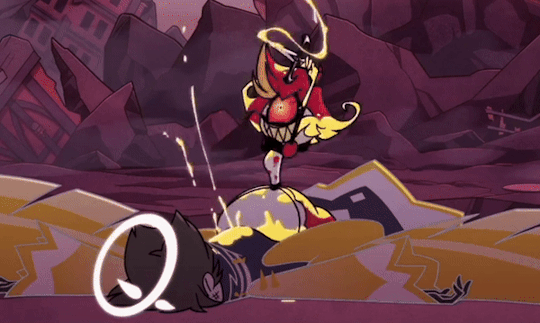
74 notes
·
View notes
Text
There is a post about ableism in the sorcerer/siege of Macindaw books. I'm not going to reply directly to the poster because I don't necessarily think they're wrong, but there's a bigger problem I want to touch on without derailing their post.
The post by @bronze-oakleaf Sorry, but John Flannagan isn't an ableist for describing disabled people as disfigured, Will is. John, although in his usual hit-and-miss style, goes out of his way to show us that the people Will and others are afraid of are not monsters. It's been a while since I read these books, but I can remember there being a few backstories and instances in which it's made clear that Malcolm’s people are just very normal people who have fun, interests and hobbies and love each other deeply.
Will's apprehension of disabled people is very clearly presented as a character flaw. John is a children's author and cannot go into depth about how monstrosity isn't physical but something that manifests in the soul a la Victor Hugo's Hunchback of the Notre Dame. Still, I don't think any child (at least I didn't) finished reading Sorcerer and Siege thinking that disabled people were any less deserving of respect and love than others and Will kinda had a point there in the beginning.
I think the only example of bigotry where there is a high chance of it reflecting John's real-life views is the way he characterises Romani and Sinti in that horrible short story. Without going into depth the key difference here is that not a single person in the story thinks that Alyss and Will are doing or thinking anything wrong. Nuance, even if it wasn't much, visible in Sorcerer and Siege is missing.
Now I have that out of the way, this post is actually about character flaws. I'm not trying to be smug by pulling the historical accuracy card, but honestly, Will's views of disabled people are one of the few ways John established the world of Ranger's Apprentice as a Medieval society. I don't know how to say this without sounding kind of like an asshole, but if you want to critique Ranger's Apprentice flaws you also have to apply the same critique to the characters within Ranger's Apprentice. Separating art from the artists in this case doesn't really work because the art exists within the context the artist created. I don't think we have to be overly critical of characters because otherwise we're bad people and not woke, but viewing your favourite characters as flawed makes them inherently more interesting. I think viewing Will as an enforcer of feudal oppression (cop), extremely privileged (has an education and can bear arms) and classist with a very obvious disdain for those who are below him (this man should be nicer to farmers who can't read) is way more interesting than a perfect boy who fell victim his author's bigoted world view. Will, and all Rangers tbh, think they're better than other people. Rangers are smart they aren't like the uneducated masses who think wizards are real and the devil will claim your soul if you sleep lying down. But are they really?
Will is confronted with the fact he is like everyone else. He's also afraid of the “dreadful caricatures of normal people”, but why? The treatment of disabled people in Medieval society was very complex, and without getting into the nitty gritty, most of the cultural feelings towards them weren't because they were 'just ugly' but relied heavily on superstition. Will might be educated, but he still grew up in a society where disabled people were viewed as cursed, their ailment a deserving divine punishment. Him not being confronted with his hypocrisy in these books is the true moral failing of John to be honest.
Now to my final statement: pleasepleaselpleasepleaseplae let the Ranger's Apprentice characters be bad people. Because they ARE. I guess this post was a very elaborate way of saying Will isn't an UWU soft boy but a grown man with hairy balls. So are Halt, Gilan, Horace, Crowley (I didn't forget the time you enslaved a man king) and Duncan (Truly truly sick a twisted individual for sitting back and doing nothing as his daughter was sold into slavery because 'We need everyone here'. That wasn't a convenient plot point so Halt could save the day but misogyny). This doesn't mean Will isn't/can't be trans (because he is) or Cralt isn't canon (it is) for the sake of historical accuracy. I just want to say that these characters are all very privileged and classist individuals with many flaws thanks to the society they were raised in, which makes them more interesting. Remember be gay AND do crime.
#sorry this got so long im procrastinating studying for my ancient history exam#rangercorpstherapy#rangers apprentice#ranger's apprentice#will treaty#didn't make it very clear but this doesn't mean you can't. aren't allowed to feel uncomfortable with the language John uses sometimes#you should thats the point
29 notes
·
View notes
Note
Just read your canary continuity and holy shit was I not prepared. I actually had to step away and calm myself down from the brink of having a panic attack MULTIPLE times while reading it (that's not necessarily a bad thing, btw, it's just that hyperempathy towards a character that I admire got hands).
It's just....the slow escalation. The way you legitimately can't tell that something's wrong at first because yeah, sometimes brothers are kind of dickish to each other, it happens, no biggie, and then it starts getting into "wait, why are they being a bunch of ableist fucks all of a sudden", and then it gets into true psychological horror territory. The way the curse takes any frustration that they might have had about Donnie's behavior- maybe not even directed at him, but maybe frustration about "god, I wish I could make things easier for my autistic brother, it sucks that he has to go through this"- and twisting it entirely on its head to make them mad at HIM for showing those traits. The way it takes their existing personality traits and twists them into something more dark and sinister- like yes, this is making me realize Leo could genuinely be a terrifying villain if he had less of a strict moral code, because he gets people. He knows what makes them tick, and he knows how to potentially wear people down until they finally snap if he ever wanted to, and seeing the curse take that part of him and use it.....it was chilling, to say the least.
Not to mention that a part of them is never really going to be fully recovered from this. The trust that Donnie has had broken is probably going to take years to build back up, and they're probably going to feel like they have to walk on eggshells around him for a long ass time. Especially Leo, god. To know that you did that to your twin, the person who's supposed to be like another extension of you, to know that you broke their trust in you and their love so thoroughly that you might never get that bond back.....no wonder he's so desperate to try and fix things, and behaving irrationally because of it.
This is super long, but I just want to say that this is an amazing fic that you've written, and....if it's not too much to ask, can you give reassurance that things will at least go back to some semblance of normalcy at the end of all this? Like, they won't be permanently broken and their relationships will heal as much as they possibly can? I can tolerate as much hurt as you please as long as it has a happy ending [pleading emoji] (Also I have a theory that Donnie is suffering from nosebleeds either because of the massive amount of head trauma that he probably got in that last fight OR because severing his ninpo or w/e is doing fucky wucky things to his immune system and I am AFRAID)
!!!! I LOVEEEEE LONG ASKS HELLOOOOOOOOOO yeasss
i can guarantee a happy ending, yes!!! i do plan on writing an epilogue oneshot that takes place ten months after CW ends (and CW will end on a happier, hopeful note!), which will show the kind of normalcy they settled into after everything settles down!! they'll get there, its just going to be a . MESS first lmfao
and ohhh yeah writing leo has also helped me discovered how terrible he has the potential to be,,, even recovering and guilty he weaponizes these skills against them (when he lashes out at raph in ch5 and calls back to the family meeting is a very good example), its a side of leo i really like exploring!! he's so tactical in his manipulation and in canon that's usually used in harmless, funny ways, but it takes a NASTY twist here as the curse takes advantage of it. and its especially painful using it on donnie, who is the least perceptive and the most likely to fall for it :( he kind of slayed in caged lungs though he was so delightfully awful
anywhizzles EATING THIS ASK IN MY MOUTH IT IS ALL HIGH PRAISE!!! hope youre doing well!! <3333
20 notes
·
View notes
Text
rambling about Haruka
As an ND person I just hate how Haruka's character is either completely infantilized or reduced to a selfish, evil murderer, when, to me, he is so much more than that.
Especially the latter; I hate when any MILGRAM character is called evil because what's the point of MILGRAM, then? They're all morally grey! That's how they test us. But Haruka in particular because I feel like it comes from a place of ableism, intentional or not.
I'm not sure if I should put TWs, but well I talk about ableism, murder (obviously lol), childhood trauma and well... it's Haruka
Haruka's outburst in the VD and his implication of killing animals (I know it's basically canon but erm... i can explain why I think it's an implication later) (i just finished writing the post and actually i explained why at the bottom of the post but its not a full explanation so lol) are the reasons I see people calling him either evil or childlike, and while I do think that Haruka is stuck in a childlike state in some aspects, this is emotional dysregulation of an ND and/or traumatized person, to me.
The uglier sides of being ND/traumatized, the ones that get heavily stigmatized and seen as intentional or evil; I think this was a display of one of them. And I really wish to see more people focusing on Haruka's disability in the ways it can affect his communication and day-to-day life skills more than "oh, poor baby, he has a disability that makes him feel unwanted" without actually understanding the details of the disability and, well, the reason why it is a disability.
Like, the emotional dysregulation that comes with being autistic, which is my headcanon for him. The hyperempathy and literal thinking that might make him harder to communicate with, and get people frustrated with him more often.
That and being severely neglected; I think neglect is one of the lesser discussed forms of childhood trauma and the fact that Haruka was shown to be neglected as well as abuse really means a lot to me, because I think some people don't quite understand just how much neglect and isolation fucks you up.
All those factors combined are a recipe for an unstable, impulsive, clingy shell of a human, and him getting called evil for that really saddens me. It's important to remember that these MVs are extracted from the prisoners' own memories and thoughts. It comes from their perception of their surroundings, their murders, and their own selves. The manic look that Haruka has on his face for a lot of AKAA, for example. The makeshift shirt he's wearing, as if he's desperately trying to sew himself together into a normal person, the exhausted, frustrated look when he picks up the necklace, it's important to remember that this is how he sees himself. A monster who has lost control of himself. The line "I'll keep killing to be your good boy" was a shock, but the way he meekly apologized to Es at the end of his VD, I really think that shows that he feels guilty, that he wants to convince himself more than anyone that he was a good person, that he was really trying to be one despite how his unlucky life frustrated him to his breaking point.
As for his infantilization, it has already been addressed by many thoughtful members of the fandom and I'm grateful to see that, but I also want to say it myself since god knows I hate being patronized.
It feels very ableist saying he's just "someone stuck in a childlike mindset/age regressor" Yes, and how does age regression as a coping mechanism develop? Usually through prior trauma that makes you "stuck" at said age, and that can present differently. It can be longing and yearning for a simpler time, for an actual happy childhood, or having flashbacks to a traumatic event that happened at a certain age; it is not uncommon for trauma survivors to be "frozen" at the age their trauma took place.
I think both of these are the case for Haruka. Frozen at that moment, but trying to reduce himself to nothing but a little, unaware child to avoid reliving it again, relishing in the innocence and purity of his good younger times (emphasis on purity--Haruka's murder was by strangulation, yet there's a shot in AKAA where he's covered in blood. I know it's after he killed the animals, but he's in the stitched-together outfit here; I think there's more to this MV than just killing the animals. Since this outfit is... not very likely to be worn in reality, did the animal killing happen at all? Even if it did, I think this shot remains an indicator that he sees himself as impure; guilty. I have a LOT to say about the inconsistencies in Haruka's MVs, but I'll save that for later... Anyway, back on topic) It is NOT "having the mental capacity of a child, so being unable to date etc." Haruka has still lived 17 years, maybe even more, since he isn't too interested in remembering his age. How do you treat actual neurodivergent people if this is how you see him?
When I rewatch the MVs, relisten to the VDs, reread the interrogations and timelines, I see no evil, just an incredibly broken, misunderstood person.
#please excuse any inconsistencies or spelling mistakes its almost 5am ive been awake all night lmaooo#im open to discussion but pls be nice :(#im a relatively new milgram fan (got into it just when ILY MV came out—got hyperfixated oct/nov) so please inform me if I say anything wrong#i love haruka so so much aaugh#i will defend him till my last breath#milgram#sakurai haruka#milgram project#haruka sakurai#jay rambles bleh idk#should i even tag this#i feel so scared to share my thoughts on the milgram prisoners AAA i hope everything makes sense
141 notes
·
View notes
Text
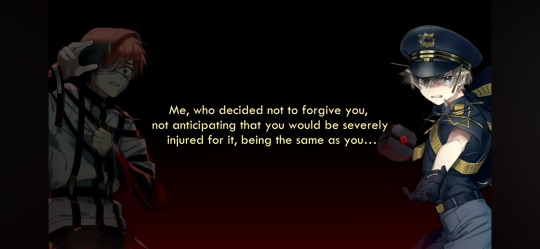
Fuuta’s accusations about Es(and us) being the same as him makes me think. Because most of us have realized that he’s right, but I need to talk about the extent of it. From his point of view, he is 100% right.
We started by judging COMPLETE strangers on things they did. The fact the prisoners can hear what we’re saying about them parallels the comments you would obviously receive when cancelled. We could simply back away from punishing these random people, but we don’t. Because it’s entertaining to us. Because some of us feel morally superior. Because some of us think they “deserve it.”
Really sounds familiar.
Yet, in another way, he’s not right at all. And really, the only reason I can think of as to why is simply because the milgram characters aren’t real.
And that 4th wall barrier has so many interesting implications to me.
In a way, the fact that we see them as fictional characters add more credibility to Fuuta argument. He also didn’t see the people he bashed on twitter as real people at first. To Fuuta, they were video game bosses to defeat. Just like us, It’s hard to see them as real when we’re all behind a screen, huh? Even though MILGRAM characters aren’t exactly real, all their stories are.
Yamanaka: I do not want my characters to be perceived as two-dimensional beings. I stick to the idea that they are based on real people who happen to have a two-dimensional appearance. That's one of my rules when creating characters. […] So, even though the setting of the story in MILGRAM is a fantasy space, I wanted the characters themselves to feel like they could exist right beside you.
(This is a quote from an interview Yamanaka and Deco*27 did back in 2020)
There are tons of people in our reality like Haruka or Mikoto or Amane or Yuno, etc. there are many people with similar stories as these characters. It’s why so many people can relate to them, why so many people have more expertise on certain characters. This relatability and understanding is why we care so much about them.
Not to mention, there’s the theory that all MILGRAM characters are based on Japanese societal issues.
So exteme hypothetical example here. Lets say someone says something grossly ableist about Mikoto. That ableist comment isn’t truly only specifically towards Mikoto, the fictional character. That ableist comment also becomes directed towards those who relate to him. And the same goes for any kind of comment really.
Yamanaka: The story progresses realistically based on the presence of the audience. […] I'm currently trying to turn the audience into characters in my work.
(Translation done by Ryuuzu (omake_ryuzu on Twitter / uzuuryu on Discord) This is a quote from the Clock over ORQUESTA collab)
In a way, we ARE judging real people. Our judgements and comments do not only reach and affect the characters, but the people in our reality too.
So, that being said, are we really that different than Fuuta?
#sorry for another Fuuta Semi-focused post#this has been on my mind for a while fkfnk#hopefully I worded it alright#milgram#fuuta kajiyama#Milkly ramble
143 notes
·
View notes
Text
I've been seeing a weirdly high level of Dungeon Meshi discourse that just. Completely misses the point lately and I'm honestly kinda frustrated about it. So.
First point of address. Laios isn't canonically autistic. He is written in a way that lends itself to the reading of him being neuro divergent, and I think if he was a real person he would be on the spectrum, but the world of Dunmeshi itself does not have the concept of autism (yet). If it did you can bet the human enthusiast Kabru would have immediately pegged Laios as such. As for Falin, she'd also likely be ND but closer to ADHD judging by the relatively small amount we get to actually see her existing as a character.
NOW THAT THAT'S OUT OF THE WAY. Toshiro isn't being ableist with his expectations of Laios picking up on social queues and being angry that he doesn't get it! Laios is legitimately rude to him! In terms of micro-aggressions, he does it constantly and unintentionally. He straight up calls Toshiro strange looking and fucks up his name! But the thing is, Toshiro's biggest flaw is that he applies his cultural norms to his interactions with everyone, regardless of culture. Chilchuck and Mick have a small talk about how Toshiro, with zero indication of feelings beforehand or any romantic involvement, just asks Falin to marry him and expects it to go well, all because she looked at a bug and he thought she was the most unique and different woman he had ever met (small aside, almost all the women he had met at this point are either family, his dad's mistress that is more of a mom to him than his own mom, his retainers, and his uhhh indentured servants/Literal Slaves)(Itsuzumi is a whole ass other conversation that I'm not even remotely qualified to talk about). He's a man of high social status that's never had to think about that fact before, never had to examine the power and privilege he has at his disposal. As a result, his expectations of people to learn his cultural norms, something he's been used to in his homeland, go unmet and are a source of friction.
Here's a real life example. In the US Midwest, if a person slaps their knees and/or stands up, sometimes saying some combination of "Welp/it's getting late..." They're politely telling their guests "get the fuck out of my house." It's impolite to ask people to leave, even politely. This is absolutely arcane and insane, why would anyone do this? Society!
Toshiro has grown up in a place where he's had to be hyper-aware of these things, where he can't verbally state what he literally wants or means. And he's conformed! He's decided to do what's expected of him. Laios, on the other hand, instead chafed against the expectations put on him as the child of the village elder and against the way people treated Falin for being different. He gave up his privilege (assured house, home, fiancee, position and responsibility within their town) in order to pursue a freedom beyond the society he saw as wrong. Laios is fundamentally uninterested in people (as opposed to monsters and demi-humans which is why he's uniquely suited to dealing with the multicultural aftermath of The Whole Thing), but he values his loved ones and personal code of honor enough to do what he needs to protect those things, even if it means going against society.
Anyways this is a long winded way of saying Toshiro and Laios are complex characters and narrative foils of each other in the early narrative and shouldn't be turned into one dimensional parodies of themselves for the purpose of Hot Takes. Thanks.
#i saw so many people calling Toshiro ableist and still calling him Shuro Despite Everything#and other people saying Laios is a terrible near irredeemable person due to micro-aggressions#that i got fed up and word vomited#discourse is stupid!!! there are discussions to be had and points to be made but these are Fictional Characters#written by a Japanese woman with an extremely nuanced view of the world#dungeon meshi#delicious in dungeon
36 notes
·
View notes
Text
top ten reasons why you should vote for the ramshackle trio in the @obscure-skirmish showdown
sponsored by my huuge special interest and infodumping tendencies
pls read it i put a lotta effort and time into it 👉👈 (but ig the tl;dr is im incredibly autistic abt zeddy and her work and i really want them to win)
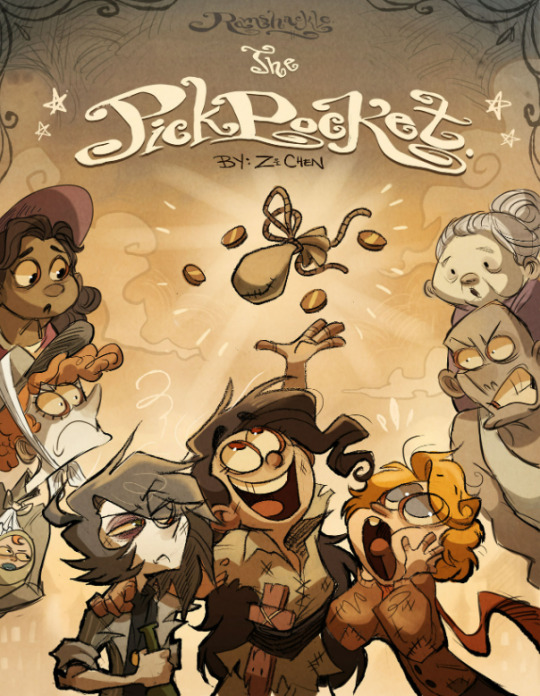
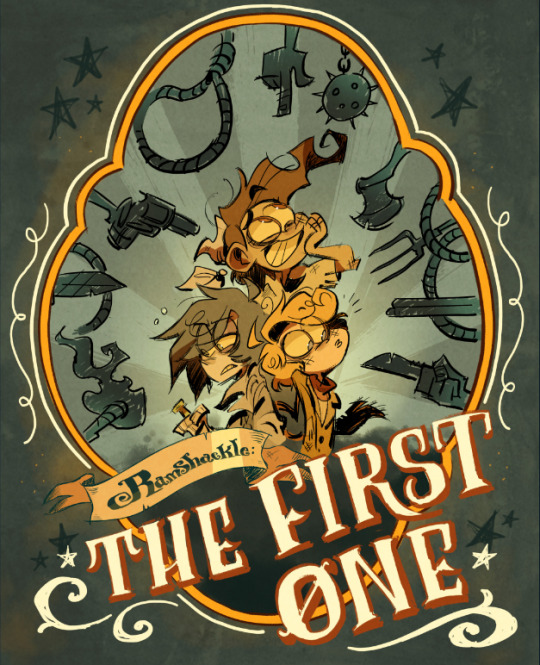
first off, who are these guys? skipp (the blonde-ish happy one), stone (the skrunkly emo boi), and vinnie (the pirate gremlin) are three hobos who do whatever they can to survive on the streets. pickpocketing, other kinds of theivery, murder, and general mischief. anything goes! the world theyre in is old-timey (@zeddyzi, the creator, has described it as walking into an antique shop). it was originally a comic on webtoon/tumblr, and now its getting an animated pilot sometimes! isnt that cool!?
so, do you like hobo children? the found family trope? little guys? amazing, unique art? funny characters? ramshackle has all of that and more!! so much more!
onto the actual list :3
reason #1: the comedy. ive already said this but lemme elaborate on it a bit more here. if you like comedy w heart, ramshackle might be the thing for you. the trio is just some dummies (endearing) doing dumb things together and they love each other and just waahhhh look at themm
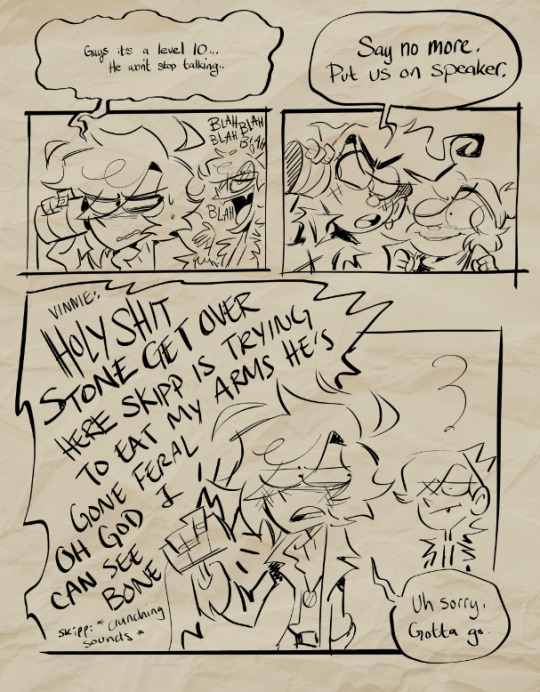
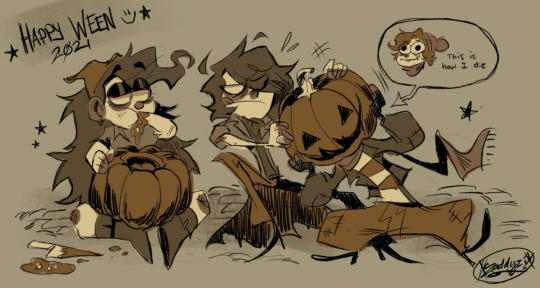
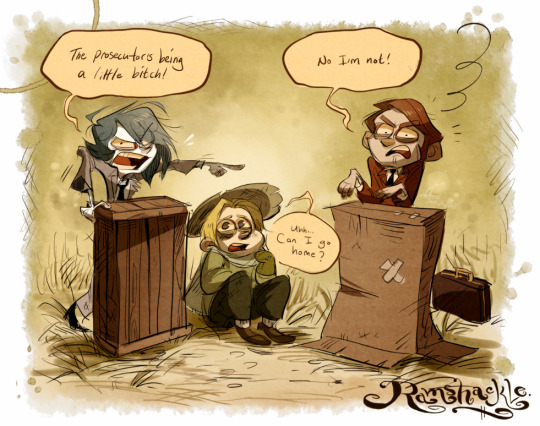

reason #2: the art. just,
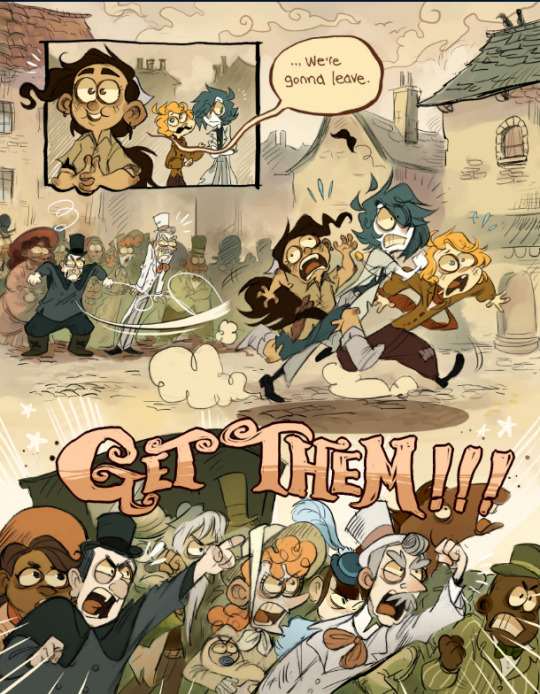
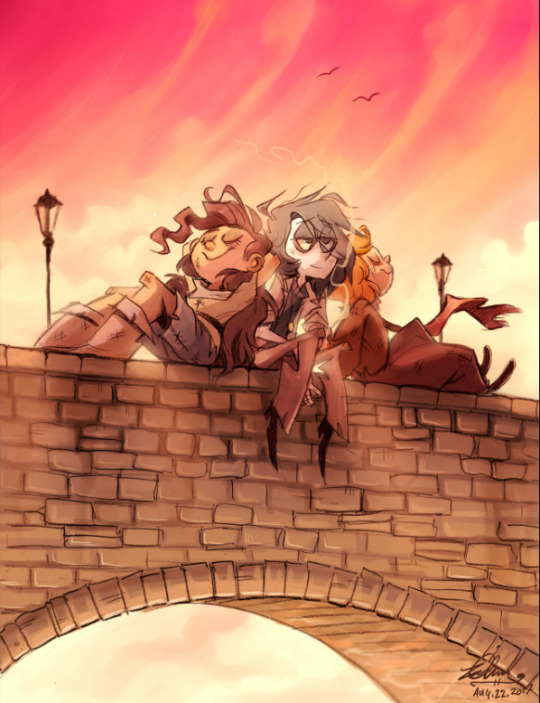
look

at it. zeddy mostly uses what i like to call a dirt color pallete. im just using more colorful examples bc i can. fun fact, my art style is heavily influenced by hers, and she also inspired me to draw a lot more. you should vote for that right?
reason #3: im really autistic abt ramshackle 🥺 and, and if you dont vote for it 🥺🥺youre being ableist🥺🥺🥺 /j (obviously vote for who you want to lmoo)
reason #4: uhh, i think im talking abt zeddy more than the actual ramshackle trio, so ehm, skipp! a happy-go-lucky air mandolin-playing apple enjoyer
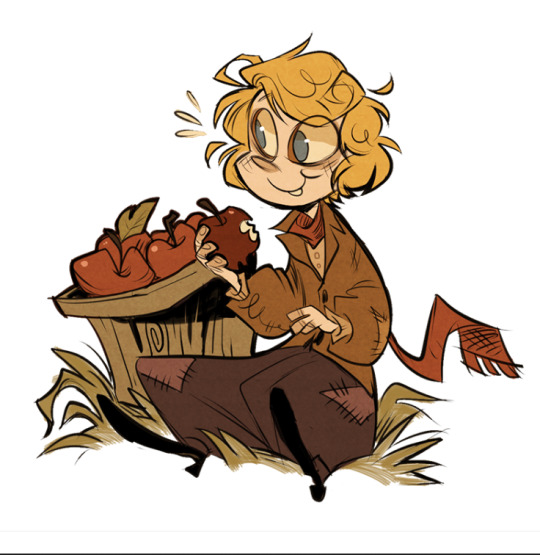
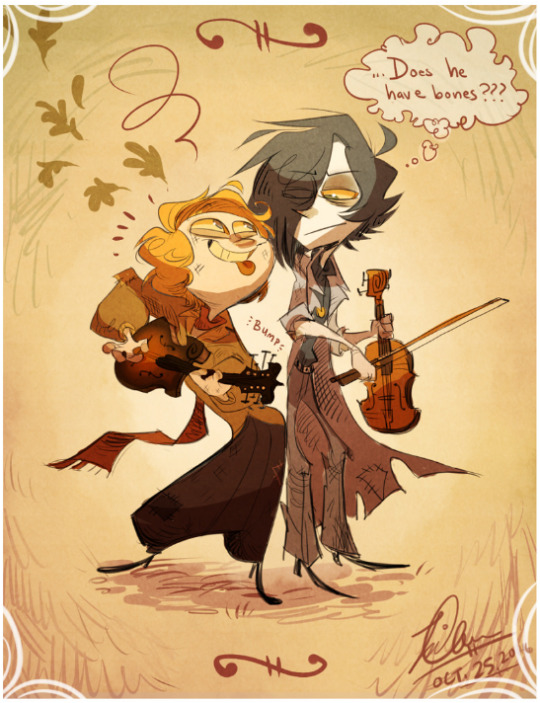
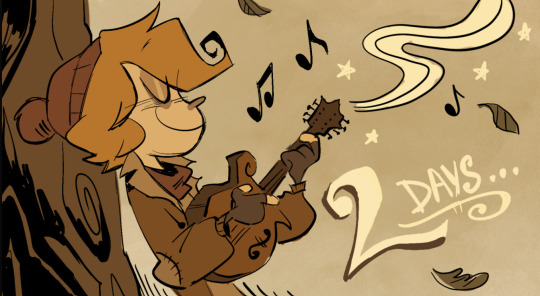
he eats apples whole, core and all :0 also since he has no money he plays the air mandolin (and keep in mind this isnt rlly recent info so maybe its not canon anymore hehe, i dont rly see timestamps on posts). hes so dumb and sweet, youd vote for him right?
reason #5: stone. where do i start? hes a sopping wet pathetic emo whos addicted to monster energy, ciggies, and the weird goo leaking outta the old shack downtown (ok that one may not be... confirmed. yet). he also somehow has most of the fandom simping for him

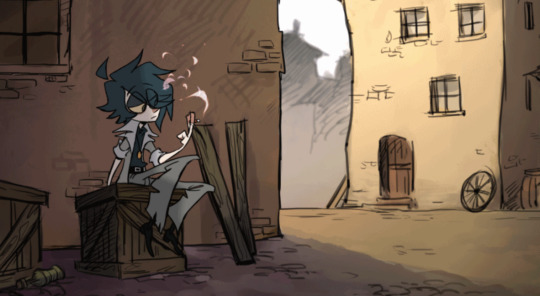
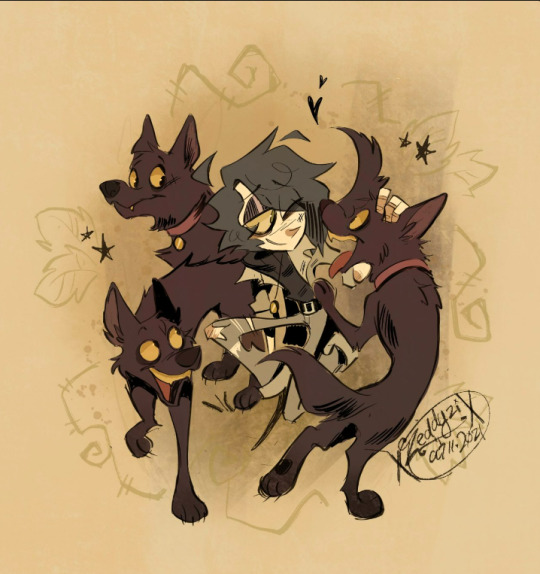
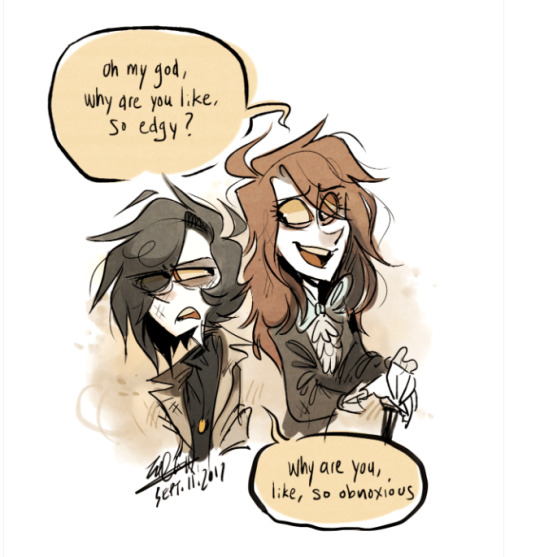
reason #6: vinnie! the money gremlin! whos also vaguely pirate themed! and may or may not have stabbed someone in the dick (theres a post abt this but i cannot find it 😭)

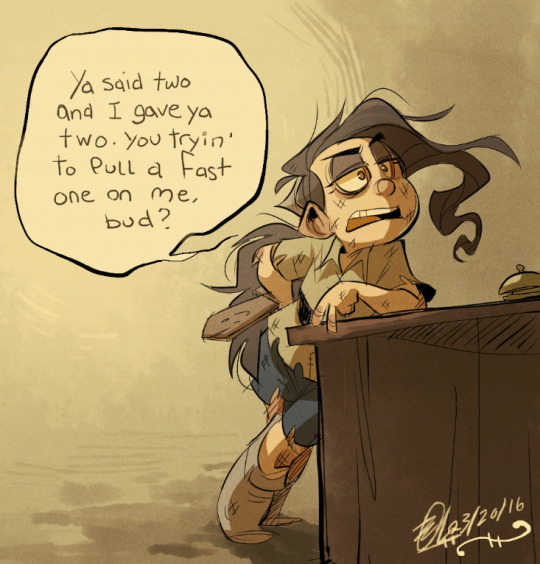
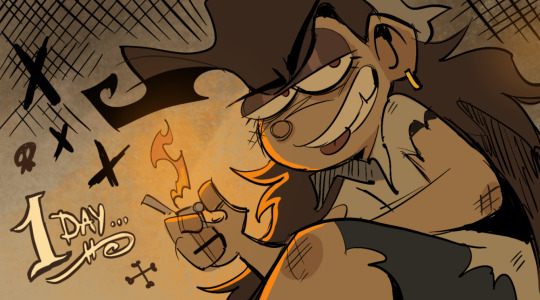
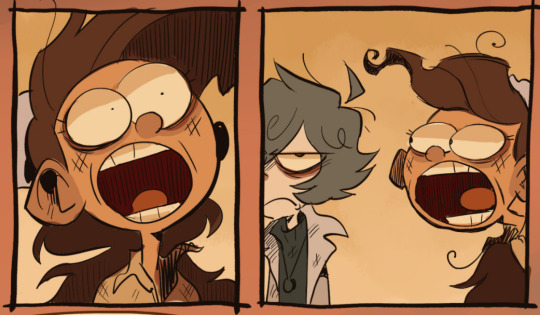
if you dont vote for her, she might stab *you* in the dick. just sayin.
fuck. reason #7: i put a lot of effort into this propaganda post
🥺👉👈
reason #8: do you honestly need any more reasons for that? i just feel like if this much propaganda wont sway you, nothing will
reason #9: are any of these technically reasons? or just me seeing an opportunity to infodump abt my favorite thing and swooping in?
reason #10:
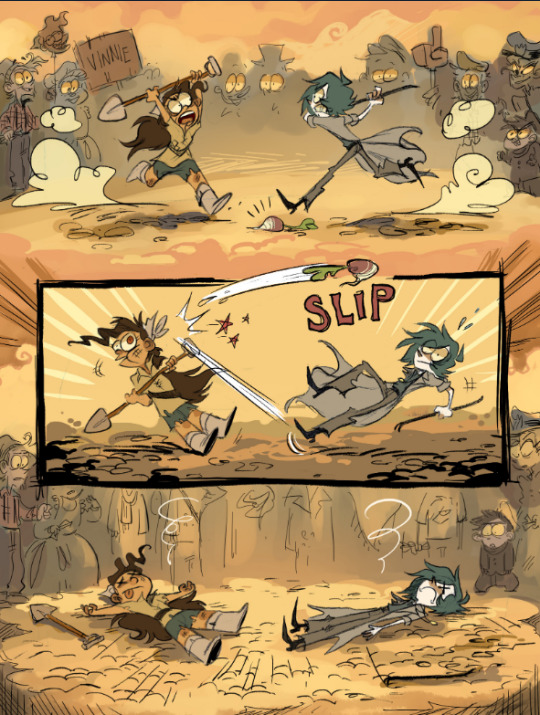
please.
#monke.maks#i am zeddys biggest fan <-(has a huge special interest on her and her work)#ramshackle#propaganda#ramshackle sweep!!!#long post#polls#tumblr polls#2023
300 notes
·
View notes
Note
Hi, sorry this is a big ask but what are your thoughts on this article?
https://powertotheplurals.com/why-the-theory-of-structural-dissociation-is-ableist/
We don't know enough to go through and say exactly that it's wrong but something feels wrong? Like that's not our experience being treated by someone who believes in the theory of structural dissociation.
Also this article was introduced to me as the argument against sysmeds but the theory of structural dissociation has grown since its creation and I can name two people who came up with theories that are the basis of modern psychiatry who should never practice.
Again though we don't really know enough to say any of that for certain and I hope we don't look silly.
Alright, let's start clearing out my drafts and inbox with this lovely ask!
I have been sitting on this ask for eons. I got it, wanted to work on it but died during the school year by way of teaching being hell, and then promptly forgot it existed. However, a thousand and one people have broken this article down for the sheer absurdity of how bad it is. Like, it's really bad.
This article is 1000% just fearmongering bullshit to steer people away from a very, very valuable theory. Anon, you do not need to feel the need to sway your opinions on the ToSD -- first and foremost, above all else, you determine what helps you the most and what theories benefit your system. Not anyone else's sayings.
But let's dig into it, shall we?
We start off with a huge image of a video about Otto Van Der Hart, author of The Haunted Self and a very instrumental psychologist in the understanding of DID. This is immediately followed by the following statement:
The above video was recently released after one of the authors of Structural Dissociation lost his license for life and can never practice again.
[VERY LOUD INCORRECT BUZZER]
He's not one of the authors of Structural Dissociation. He's one of the authors of The Haunted Self. He did not invent the theory; the Theory of Structural Dissociation was not the invention of The Haunted Self. The ToSD was the invention of many, many, many people working together to understand pieces of dissociation, and Van Der Hart, alongside Kathy Steele and Ellert R Nijenhuis, created The Haunted Self to publish a focused overview of everything related to it. To call him "one of the authors of the theory" is really discounting the fact that this theory is far more wide-reaching than just The Haunted Self.
But that's me being a little nitpicky.
Me being VERY nitpicky is their linked article immediately after this statement with the falsehood about how Final Fusion only works 12.8% of the time. This has been thoroughly debunked. Here's an example of a debunk! I'm incredibly frustrated to not even be able to get to the bulk of the article, simply because they're so insistent on plugging their own misinformation.
Then a link about Otto Van Der Hart losing his license... Then another link about it... Why is this necessary for "The ToSD is ableist"? Seems like you meant "Otto Van Der Hart is ableist" and your editors just got confused by the 4 letter word. Let's see, one last PTTP link... Okay, article time!
Anyone who has watched a DID youtube video, or read a few posts in a support group, has seen it pass by: The theory of Structural dissociation, written by Ellert Neijenhuis, Onno van der Hart, Suzette Boon and Kathy Steele.
Very confused why you keep saying the ToSD was written by these people, but you continue on to acknowledge that the ToSD was not written solely by these individuals. This article feels disjointed as fuck and there's only actually been like... two paragraphs! How did you manage that?
It’s good to know that in 1987, the writers of this theory already referred to us as parts, not personalities or alters, as the common terms were back then. Now, you might think this was progressive, ahead of its time — but was it really?
Yes. It was. As someone who is relieved to be seen as a part of a whole, rather than a distinct personality who is wildly out of control, I'm thrilled to see parts language in my history.
It was actually, psychologist and psychiatrist Charles Samual Myers, who in 1916 wrote about Apparently Normal Part (ANP) and Emotional Part (EP) after acute trauma in WW1. So it is fair to say that the theory of Structural dissociation borrowed these terms, not introduced them, as is readable in the haunted self. (page 4)
Yep. So why were you so insistent for so long that the authors of the Haunted Self "created" the theory when... you're literally acknowledging some of the history of the theory here?
Let's see... you then acknowledge another author who should also be credited as helping to create the ToSD, once again contradicting the start of your article...
It is also good to realize that the theory of Structural dissociation is neither about DID, nor is it about alters, as many of us Plurals know them. They speak of ‘dissociative parts of the personality’, caused by trauma. Nota bene, not early childhood trauma, trauma in general. As this theory of structural dissociation also explains single trauma, repeated trauma in adulthood and (early) childhood trauma. It is used to describe changes that are diagnosed as (c)PTSD, trauma related borderline personality disorder, DID and more.
Yeah, this part is true! The ToSD is not only about DID, or childhood trauma, or even repeated trauma. It's... about structural dissociation. It's in the name. Not sure why so many people are so confused about that.
As you can see in this image, all types of Structural dissociation have EP and ANP elements which Myers talked about. In other words, the theory puts forward that all traumatized people have ‘dissociative parts of the personality’ as this is just the collective name for the EP and ANP. Thus, plurality does not just happen in DID, as many people with DID like to claim.
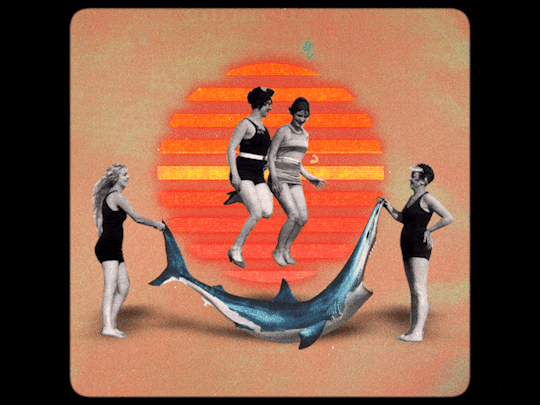
The theory of structural dissociation is not about plurality. You said it yourself that it is neither about DID nor about alters. It is about trauma causing dissociative parts of identity. All traumatized people have dissociative parts of identity, but that does not mean that all traumatized people are plural. Because that's what you're poking at by listing that as plurality.
These dissociative parts of identity are not necessarily fully formed parts. From every single person I've met with PTSD, their ANP/EP structure is nothing like mine -- not just in the fact that I've got more of that sort of thing, but in the fact that their ANP and EP don't have goddamn names. Their parts of self are not full identities that take over the body; they're states of mind.
Now, does that preclude someone from calling that plurality? No. People can call anything plural, if they feel that label fits. But to suggest, looking at these charts, that it is universally plurality -- that the existence of ANP/EPs is plural inherently -- is jumping the shark to the largest degree.
(Lastly, as a syscourse side note -- please stop conflating DID with Anti-Endo in your posts. "Many people with DID like to claim" just say anti-endos. Just say sysmeds, for fucks sake, I would prefer that to you making it about DID)
From which we can conclude that OSDD, complex PTSD, borderline personality disorder or extreme stress may also have alters as we Plurals know them, or at least as the ‘dissociative parts of the personality’, which this theory of structural dissociation calls us. – From a Plural perspective, I do not understand the differences, besides being integrated less in DID (or tertiary Structural dissociation) compared to more integrative capacity in secondary Structural dissociation of the personality.
"I don't understand the differences, besides (lists the vital difference to why DID is called dissociative identity disorder)"
Also, not a single person was arguing that OSDD does not have alters. That is baffling to me why you included that on the list. Furthermore, yes, these could be plural -- but they are not alters similar to DID. There is a major difference there, in that in DID, the alters are fully developed identities, whereas in most cases of PTSD and borderline personality disorder, they aren't. But I will give you credit here -- this time, you said "MAY" also have alters. And yes, I would give you that credit -- some people with borderline personality disorder may see their splits as plural in some way.
But I have found, through talking to people with various trauma based disorders, that often, my alters are very different from their whatever they are experiencing. Because, once again, I am far more distinct. I've actually spoken once to a friend of mine with PTSD and OCD on this topic, because (due to her OCD), after meeting me, she believed she might be plural. It wasn't the case, but her states of being were distinct enough that she felt that way, however briefly. And then she stopped identifying that way, as it was harming her mentally to do so. While that is not the case for every individual who feels plural, it was the case for her. I don't want to look at PTSD and say, "This makes someone inherently plural," because it doesn't.
So, simply put, the ToSD is not about plurality. It is about dissociation of a single personality; not about multiple personalities. While the other disorders listed in the theory can be plural, they are not inherently so. (And this still has not explained why the author believes the ToSD to be ableist).
If DID is not Plurality, then why have such a thing as a DID diagnosis? What is the difference then between complex PTSD and DID, if not the Plurality? – More on this topic next time!
I've deliberated on this point for awhile (and I do NOT care to try to hunt down if PttP made good on their promise and made another article about this idea). I actually tried to discuss it in a server I'm in, which went a bit in a loop due to "plurality" being inherently seen as endogenic plurality (maybe I'll make a post about that sometime).
But leave it to my singlet partner to knock it out of the park, lol.
They brought up the fact that they have spiraling depression; depression that is worsened by other disorders they have, such as ADHD and anxiety. It just loops around continuously. Now, they could have a hypothetical diagnosis (just like C-PTSD would be, as that's not an actual diagnosis that exists) of "Spiraling Depression." But would that diagnosis be as informative as their multiple diagnosis of depression, anxiety, and ADHD?
By having the specific diagnosis they have, they're able to get more clarity on symptoms and understanding of what's happening. And I think that's a compelling argument for DID over C-PTSD in this case. Because, PttP, like it or not, plurality is disordered for many individuals. Even if the symptoms of DID and C-PTSD do overlap in many ways (and differ -- for instance, C-PTSD has far less correlation with dissociation and amnesia, and DID has far less correlation with emotional regulation problems and flashbacks to trauma), they overlap in such a way that it is important to be specific.
And yes, DID is specific in the fact that alters are part of it. No, DID is clearly not just plurality with C-PTSD, as you argue. There's a lot of different factors that differentiate the two disorders. But even with the large amount of overlap they can have (to the degree that the two are so highly comorbid that I see people argue you can't have DID without the other), the plurality is disabling for many individuals. And I say this as an individual who is not disabled by their plurality, and yet is diagnosed with DID.
The reason there's such a thing as a DID diagnosis is because having multiple, dissociative identities is disordered for many individuals. For me, I am disordered by my DID in the fact that I deal with severe amnesia that distresses me, as well as issues that correspond to C-PTSD. The treatment may be similar -- but if I were simply diagnosed with C-PTSD, I would not get the specific care I need, that being an assurance that my individual parts get the help they need. Which you, PttP, rally against later in this article (at the Systematic Approach to Dissociation section).
The haunted self states that Structural dissociation has become chronic in those patients with trauma-related disorders. (page 12.) Which, first and foremost, means that Structural dissociation is not a (trauma-related) disorder on it’s own, as some people claim these days.
Accurate. It's a symptom, not a disorder. I believe what PttP is getting at here is the claim that dissociation is only a symptom of dissociative disorders; however, that's now what that sentence actually says, and it's incredibly frustrating to see this pair of sentences to try and make that claim. "The Haunted Self says that structural dissociation is chronic in patients with trauma-related disorders. This means that structural dissociation isn't a trauma-related disorder." Okay, yes, but that does not negate that it is talking about disorders, not plurality.
However, I point this quote out for a different reason. The theory of Structural dissociation idolizes integration. And although they say that ‘’no one has to go away’’, they also clearly explain to therapists, to not engage with us ‘dissociative parts of the personality,’ unless absolutely needed. Instead it is suggested that the therapist speaks whenever possible, through the ANP fronting. We the Plurals, then have the most integrative capacity, which basically means we can integrate the experience best. Which should be encouraged by the therapist at all times. I can understand how it is useful that ‘everyone’ listens in during therapy. But this should not be the case when we express ourselves!
And here we get to the bulk of the picture; PttP's hatred of anyone who so much as dares consider final fusion as an option for recovery.
First, let's correct a major misconception that I have had to correct timelessly in my time on systumblr. Integration is not final fusion. Integration is the lowering of dissociative barriers in order to communicate and function with your system as one whole; this could be through working together (functional multiplicity) or through fusing into one being (final fusion). And, as a few users in sysumblr have pointed out recently, these two things are not diametrically opposed. There's no hard and fast line between FM and FF. They're both just signs of recovery, and any recovery is beautiful. To shame anyone for going a specific route that makes them feel better is shameful in of itself, imo.
Second, let's tackle the image that PttP provides and show you why their quotes-out-of-context are complete bullshit.

"ALL interventions need to be geared toward increasing integration and decreasing dissociation" -- All treatment needs to be geared at helping alters connect with each other and decreasing memory barriers.
"Always use interventions at the highest level of integration possible, e.g., if the client can work with all parts, it is not necessary to work with parts individually" -- I can communicate with all of my parts. My therapist does not need to explain to each of my 14 parts the same exact thing each time they show up; he can work with me one week, and the next week, Curtis will remember what we discussed and can continue without my therapist needing to explain what we did last week -- I just make sure that Curtis is on the same page as me before that session.
"Use integrative language. 'Parts' language is OK, but emphasize 'Parts of you.' Parts should not be treated as individuals -- An individual as in someone who is not sharing a body. An individual as in someone who is a separate body not sharing it with 13 other people ffs. By focusing entirely on "You're an entirely different person," then it's going to be really hard to convince a patient in the throes of flashback, "I know YOU didn't experience that particular trauma, but that other person did, so now it's your problem to deal with" without reminding them that you are together in this one body. (Furthermore... This just straight up isn't as common in modern therapy, at least from what I've seen and experienced. I had to CONVINCE my therapist to stop fucking calling my parts "people" because it made me angry to be stuck in this body. Now I use parts language, and I'm not stuck in this body, I AM this body).
Lastly, I want to highlight: "Always be curious about what a part is unable to realize: this is the treatment target" -- this, to me, is so vital, and I feel like PttP skips over it. This is connected to the "highest part of integration" point; if a part isn't at the highest part of integration. If a part cannot realize something, it is up to the therapist to help them treat that. For instance, I just worked on EMDR yesterday with my therapist on realizing I am capable. Shockingly, about two EMDR sessions ago, Curtis did that same realization -- but as a part, I couldn't realize that myself. So my therapist had to work with me, as a part, directly.
So, to recap: this is all fairly standard, healthy guidelines for working with systems. Don't pit the parts against each other by implying they're all completely separate, work on communication and lowering barriers, and don't repeat yourself when you don't have to.
How's PttP feel about this?
"And although they say that ‘’no one has to go away’’, they also clearly explain to therapists, to not engage with us ‘dissociative parts of the personality,’ unless absolutely needed." Nope. I don't see that anywhere above. "Instead it is suggested that the therapist speaks whenever possible, through the ANP fronting." Also incorrect; nowhere in the above picture does it suggest that the therapist speak through the fronting ANP. That would certainly make my therapy difficult, given that we don't even have clear ANPs; my therapist just works with whoever is out. "We the Plurals, then have the most integrative capacity, which basically means we can integrate the experience best. Which should be encouraged by the therapist at all times. I can understand how it is useful that ‘everyone’ listens in during therapy. But this should not be the case when we express ourselves!" Wow, it sounds like whoever wrote this article feels very separated from their other parts. It sounds like the therapist will need to work at the highest level of integration possible, which is really low for your system. Your therapist would need to work with individual parts far more than mine would, because you don't have a high level of integration currently. Nowhere does it ever suggest that your ANPs need to be out for therapy. That's your jaded and biased view of a completely neutral statement.
To me, it sounds as if they want to make us all like OSDD, where one part regularly fronts and others speak through them. And although I think there is a dissociative spectrum, I do not think that changing the diagnostic criteria we meet from the diagnosis of DID to OSDD will lead to ‘healing.’ And in DID, in particular, requiring all communications to relay through one particular (perhaps malleable or favored) ‘alter’ that sounds a lot like silencing to me. Because the therapist (or any other outside person,) can never know (for sure) whether the part who is presenting, is truly conveying all information which is coming from inside. This book talks a lot about shame, but forgets that our ANPs might not feel comfortable repeating what those EPs just said inside, and that the information may be so overwhelming for them as to cause them to have intense dissociative symptoms. Half-truths might reach the therapist.
"They want to make us all like OSDD" -- not a thing. Stop fearmongering.
"Changing the diagnostic criteria we meet from the diagnosis of DID to OSDD" -- Part of the reason I am all for getting rid of both of those diagnosis and just changing it to CDD, so that people can't make this absolutely batshit argument.
"Relay through one particular (perhaps malleable or favored" alter" -- Already reviewed this, but jesus christ I hate that you just called them malleable. That is so horrifically ableist, to suggest that the fucking therapists -- people who are helping systems -- are just trying to manipulate an alter. Fuck that.
"The therapist can never know for sure whether the part who is presenting is truly conveying all information which is coming from inside" -- =_=.... "Hey, Wade, good to see you! So, what do you remember from last week?" "Wow, hey therapist, I am going to tell you the honest truth, I remember exactly jack shit." "Alright, so let's review-" It's as simple as that PttP. When we aren't able to communicate, we just... review. And if I decided to not be honest with my therapist... well that's just a fucking waste of three hours (two for driving, one for session) and money (gas and session cost).
The final few sentences is running with their misinterpretation of what the image was actually saying, so I'm not going to harp on that any longer.
The writers of this theory of structural dissociation explain dissociation as experiencing separation in simple terms and in more difficult terms use the meaning of the term dissociation, formulated by Pierre Janet (1859–1947), ‘’Structural dissociation is a particular organization in which different psychobiological subsystems of the personality are unduly rigid and closed to each other. These features lead to a lack of coherence and coordination within the survivor’s personality as a whole.’’ (Preface Haunted self)
To translate that, for the layman: Structural dissociation is when parts of the personality are separate from each other, leading to a lack of consistency in a person's being. This can be represented as plurality (such as in CDDs) or as just inconsistent singular personality (such as in PTSD).
They explain integration as ice cubes melting and the water coming together, or dams breaking and water coming together. Which to them equals no one goes away. Everyone is still there, it’s just one body of water now.
Because they're singlets who don't get it. Rather than being a bitch about it, we could... explain in better terms, which so many fucking people have done. For instance, I use the puzzle piece metaphor for ourselves. We are each one puzzle piece; when we come together, you can still see the lines that show I'm a piece of the puzzle, but we are now together. But even if we use their metaphor... Nobody went away. The ice cube melted, but that doesn't mean you suddenly have less water. You're still there. Just together. By phrasing it as "going away" when fusion happens, you're purposefully fearmongering what actually happens in fusion; it's coming together, not someone going away.
To me, it sounds more like soup, because not everyone in a system is the same, like with water. So you throw in your EPs and ANPs (and those are very limited terms for our diversity!) and then you have a soup. Although soup is great, it is not the same as the loose ingredients. A potatoe is a potatoe. A carrot is a carrot. But potatoe-carrot soup is something new and different. You cannot remove the potatoe from the soup, it is no longer a whole potatoe. And potatoe-carrot soup cannot do the same things the original potatoes and carrots could do.
.... I will not lie, this confused the fuck out of me. Is this another analogy for integration? Very confused. Have fun though.
We know from a 6 year follow up study that only 12.8% of participants were able to reach integration as described in the theory of Structural dissociation. (page 4) That is a very low percentage. In any scientific research for medicine or therapy for example, a 12.8% positive outcome would not be tolerable. Yet the whole theory of treatment within Structural dissociation is based on it.
Once again, this was debunked (same link as above). Also, the ToSD isn't fucking based on fusion. It's based on structural dissociation. Yknow. As it says in the name. The therapeutic treatment is based on integrating past dissociation. Yknow. Integration. Not fusion.
A chronic disorder, often debilitating, with a much-respected and idolized healing option with only 12.8% success rate, sounds ableist to me
... how? Genuinely, how is it ableist? Ableism is discrimination against disabled people. How is... How is trying to help people with a disorder discrimination?
Favoring OSDD over DID comes from singular normative biased thinking
This just straight up isn't happening, you just read something in the worst faith possible and pissed on the poor because of it.
The haunted self has a chapter dedicated to phobia of dissociative parts. Maybe the writers, should re-read the chapter and apply it to their own way of thinking.
Oof ouch the edge. Anyways, now I want to read that chapter, I'm curious if they go into the shame around splitting in DID.
It also sounds to me, as if clinicians say something else to our face, then what they write in their books. Especially when it comes to alter integration or final fusion as Kluft calls it.
Integration and Fusion are not the same thing, and a clinician in 2019 (when this article was written) may not match the novel that was published in 2006, based on psychology from as early as 1916. It's almost like shit progresses and time keeps moving! Remarkable I know.
Although I do not think personalities is the right term for us, nor is the word parts. It is derogatory, dehumanizing & it is taking away from our autonomy, roles and authenticity as individuals.
[Stares in "I have never felt more alive, authentic, and real than when I was referred to as a part of a whole"]
[Stares in "I use it/its pronouns and this individual probably hates that huh, if they're so against dehumanization"]
[Stares in "Just tell your fucking therapist what goddamn language you prefer, because I had to do that too, you aren't fucking special"]
Anyways. Parts language is not universally derogatory, dehumanizing, or taking away your individuality. For me, it has been incredibly healing. Furthermore, it is genuinely what is happening from a medical standpoint. From a medical standpoint, splits in DID are occurring due to, you guessed it, trauma. You don't suddenly just... get possessed or mitosis a new person in your brain who is entirely separate from you. The parts of you are parts of you, regardless of how you label them, because you are composed in one body. If we get into possession and endogenesis, then remarkably, the ToSD does not apply, because the ToSD is strictly about structural dissociation. Not plurality.
And so I often wonder whether the alter integration they desire, equals just not being Plural anymore in the minds of the writers of Structural dissociation. If it does, it makes sense to diminish us to parts. And it also makes sense to claim “no one has to go away”, if they never believed we are separated in the first place. After all, it is the ‘experience of separation’, not actual separation, as they say, we did not split off. So was using the term ‘parts’ in 1987 progressive, or a step to further diminish, gaslight and silence us?
If you wonder about this often, you need to step the fuck away from system spaces and touch some grass.
Integration is not fusion, I cannot stress this enough.
Fusion does not equal no longer being plural; ask any fused system (or hell, just a fused part) and they will tell you, flat out, "I'm still us, just different." If someone no longer wants to identify as plural due to fusion, is that not their choice? Why would you care about someone else's experience that much?
Being parts is not diminishing anything, as someone who uses parts language.
If we are multiple parts, and the ToSD acknowledges us as multiple parts, then clearly the ToSD acknowledges we are separate. The goal of the theraputical practices that revolve around the ToSD is to help lessen the separation between parts. Not remove us entirely. Still not sure where you got that idea from, other than your fearmongering about Fusion.
Using parts language was literally just people looking at MPD systems and going, "Huh... you know, maybe that is a single person and not multiple people crammed into one body. Maybe that is just a severely traumatized individual, and we should treat them as a person, same as anyone else."
Or maybe they were all high on cocaine. That's possible too.
Here is my problem with how the DID community treats this theory. From the community feedback it seems that many of you do not want integration, as explained in this theory. And you cannot cherry-pick the sweet parts, when it comes to theories like this. Especially not when integration is so interwoven with this theory. The theory of Structural dissociation is often presented as truth in our communities, even though this theory is not widely accepted, not acknowledged, not proven (or provable) and hence just a theory like any other – there are many theories about DID.
Obligatory "integration and fusion are not the same." Furthermore, this idea is based on community feedback in 2019. I can't wait for 2029, when things will be completely different once again. Lastly, the theory is widely accepted. It is the most accepted theory of how dissociation works structurally that we have. While there are other theories about DID, I have not seen any of them that better describe my experiences or make as much sense. (And, unsurprisingly, you don't add any of those alternative theories here).
You also cannot say you like the application of this theory for DID, but not for borderline and vice versa. The theory comes as a package deal by explaining a progression of Structural dissociation. I think many people did not read all of the haunted self, as it’s long and dry. And even though most quotes from this article come from the first few pages, it is information many do not know. I read the book twice and followed a conference with its writers. I hope this article explains things, to those who endorse this theory without having actually read it. There are many more questionable things about this, but I cannot address them all.
This article only explained your personal vendetta against fusion and parts language, and your lack of ability to comprehend a percentage point. It did nothing to further the understanding of plurality, as the ToSD is not about plurality, and it didn't even explain why the ToSD is ableist. Nowhere have you explained how the ToSD itself is discriminating against disordered/disabled individuals. You just threw the word out, primarily while focusing on the therapeutic practices that utilize the ToSD. Even if we came to an agreement that the practices that utilize the theory are ableist, that does not make the theory itself ableist. Good grief.
Obviously it is not needed to throw away the baby with the bath water either, that is not what I am proposing. What I am proposing though, is that you take a second look at the theory you endorse and why.
I endorse it because it is the clearest understanding of structural dissociation I have found, and it helps me to conceptualize myself as multiple parts within one whole. If that doesn't work for you, congrats, the theory doth not apply. You can find therapists who don't agree with it and who will work with you directly without the ToSD.
But to say it is ableist because it doesn't fit your particular framework is prideful at best and fearmongering at worst.
Because if you just like the part about how we are not split off, but born with different self-states you can quote Putnam. And if you like the idea of PTSD consisting of EPs and ANPs, you can quote Myers. And if you like fusion integration, you can quote theory of Structural dissociation.
Nowhere in the theory of structural dissociation does it suggest you need to fuse. Nowhere in the Haunted Self does it suggest you need to fuse. Nowhere in modern therapeutic best practices does it suggest you need to fuse. You are simply trying to scare people, at this point.
That's... about it for the article. It is horrific from everything I was seeing, and I cannot even begin to process the lack of context. I think it's because, as Stronghold says in the comments, this article was based on a conference they attended. They attended a conference where people discussed the ToSD.
Would it not be better to say, then, that the conference is ableist?
But that wouldn't really draw in a big crowd, would it? Not as many clicks or views. Why not challenge the entire theory? That would get a lot more views. A lot more clicks and attention. Isn't that the point of articles like these? To be seen and viewed?
I implore everyone to remember that this was an opinion article. It is not based on fact; it is based on the authors own bias. This is Stronghold's personal feelings about the ToSD, based on their personal interpretation of the ToSD, based on their personal beliefs on fusion. They try to use quotes to back up their claims, but their claims are entirely based on opinion.
So, to counteract that: From my opinion, the ToSD is not ableist, and while ableists have used it in the past to hurt others, that does not make the theory itself bad. The theory is incredibly useful, and everyone who struggles with dissociation or trauma disorders should do a bit of research into it to see if the framework works for them.
FURTHER READING:
Syscurse posted this link to the System Speak podcast debunking this article. A good podcast overall!
Here's a PDF link to the Haunted Self. I never actually read the whole thing before, so I'm happy to have found a PDF online of it. Cannot vet if that's a good link or not, but I'm moving pretty fast now that this thing is around 5k words.
A debunk of this article from SysmedsareSexist, which, funny enough, I did not read before writing this big long post.
Hiiragi and SoaF's comments about parts language in the article, and a very good reminder that we should critique how science looks at disorders, and discuss potential ableist views -- I don't disagree with that at all. It IS possible that the reason parts language is used is meant in a dehumanizing manner -- but I also think it's good to dig into those ideas and figure out why we feel that way, and what evidence there actually is for it (rather than misinformation about fusion being used as a major basis for the argument).
And honestly, just make sure to look up information on therapeutic practices and the ToSD folks!
#syscourse#asks#anon#armageddon comes while i’m sleeping#clearing out the inbox#debunk#power to the plurals
25 notes
·
View notes
Text
Yeah I’m making another character rant post sue me, but it’s actually crazy to me how many people I’ve seen just going full hater mode on toshiro?? Obviously you’re allowed to not like a character, but people are villainizing him so hard, it’s wild. Like as an autistic person who has had people pretend to be friends with them, yes that shit HURTS. And the way toshiro went about his relationship with laios(especially for so long) definitely wasn’t healthy, but also like. It’s so much deeper than that?? And I’m glad I’m starting to see more people talking about this lately because honestly, it’s right there guys.
First things first, I do want to remind people that being “polite” and not telling people you don’t like them, but subtly signaling it, is still the standard in most social situations! And it doesn’t make much sense to me and it sucks for a lot of people and causes miscommunication, but it’s not like toshiro’s some big bad evil guy for following unspoken social rules that most neurotypicals also follow. Also also, given that dungeon meshi’s setting is definitely not modern, the characters probably don’t know what autism is! They just know that Laios is weird about monsters and doesn’t do well socially. All the characters have problems, many of which are accentuated for us by how normalized a lot of things are in a modern world, and a lot of things not being acceptable/normal. Obviously these are still issues for the characters, and are addressed/resolved as such, but we need to put it in perspective just a little bit.
Toshiro lashed out because A) he had just gone through some CRAZY ASS SHIT, which I feel like no one brings up. He just learned that his party companions used illegal magic that pretty much everyone agrees is dangerous on the woman he loved (yeah the way he proposed to falin without any previous communication was weird but that’s a whole nother can of worms), and it ended horribly for her! and B) he was exhausted. He had just gone days with little to no food, very little sleep, and there’s Laios, well fed and rested and to toshiro, not at all treating the situation with the seriousness it deserved. And it just hit home with how much he and Laios had clashed, how Laios was so open and honest about every little thing, and oblivious to what toshiro thought was extremely obvious. Toshiro had been raised to be quiet, polite, respectful, etc. and as a result learned to bottled up his feelings, so when he saw Laios being able to say whatever was on his mind, he understandably envied that. Even though we know that it’s difficult to be on Laios��� end, toshiro saw it as a privilege. Not only that, but he had been trying to signal to Laios (not exactly effectively but) how he felt for YEARS. And his point never made it. Everyone talks about Laios being misunderstood, but what about toshiro? What about his years of trying to communicate in the way he knew, and not being understood? I think everyone knows exactly how frustrating it is to feel like we’re being SO obvious, only for it to still cause miscommunication. So why not extend that understanding to toshiro?
Aside from all this though, it’s still clear that he does care about Laios, even though he’s annoyed by him. He literally gives Laios a bell that, when rung, would ring a matching one and be a call for help. Another example- which albeit anime only’s probably won’t know, I only know because I saw the panel- is in the finale I think, toshiro defends Laios to the elves. He sticks up for him and places his trust in him, even after everything.
Neither side was really in the wrong, but people are bashing toshiro like crazy. Unfortunately we don’t have a lot of big scenes with him outside of that meeting in the dungeon, so most of our opinion is formed off of that one moment, but that moment tells a much bigger story than just, “toshiro bad and ableist, laios poor autistic puppy.” It’s been said countless times on this hell site and beyond, but I am BEGGING people to please have a little critical thinking as a treat. Like Ryoko Kui wrote this story and the characters so much more complex than good guy and bad guy. (Slight spoilers maybe) Not even the BBEGs are really all bad, when you get down to it. Everyone’s feelings and experiences are shown from their perspective and contextualized to the audience extremely well IMO, which is one of the reasons I love dungeon meshi so much. Anyway point is think deeper folks.
#dungeon meshi#delicious in dungeon#shuro dungeon meshi#toshiro dungeon meshi#laios dungeon meshi#character analysis#I’ve used that tag so many times#I just yap and yap#misunderstood characters I’m taking you under my wing
26 notes
·
View notes